

Sample Statement of Purpose – Human Resource Management
This sample SOP was used by a non-native English speaker to apply to a master’s program in Human Resources Management in the UK.
If you need help writing your SOP, check out our SOP Writing Service
Statement of Purpose – Human Resource Management
As college and graduate degrees have become more important in the modern job market, it has become increasingly important to find ways to stand out and offer a competitive advantage. This is why I have decided to leave my native country and pursue a master’s degree in the UK, as the exposure to its world-class education system and the experience interacting with diverse students in a western environment will give me a crucial edge in my career. I am applying to your master’s program in Human Resource Management in order to prepare to help manage my parents’ company in the future. This company is currently struggling to grow and compete, and in my view this is due largely to human resources factors, such as recruitment/training programs and more comprehensive solutions for situations such as the retirement of key section managers. That is why I have decided to study Human Resource Management, as I want to help this company solve its current problems and deal with future problems of human resources management, which will be crucial to its long-term growth.
Currently, I am completing my final year in Goodwell University’s Department of Tourism, which is part of the management school. In this program, I had the chance to take the course Human Resources Management, in which I learned about the challenges of managing the human resources in organizations of different sizes. The various case studies we were assigned gave me a practical understanding of how to solve these problems. In addition, I had a number of related courses, including Management, Organizational Behavior, and Economics, from which I learned about the broader structure of organizations, grew more familiar with different approaches to management, and developed a foundation of knowledge in both theoretical and practical aspects of economics. Such wide-ranging professional knowledge is vital for a successful human resource manager, and I expect that this background will prove immensely useful when undertaking graduate studies of Human Resources Management.
Outside of class, I had an internship at a hotel, which proved among my most formative learning experiences. I received a great deal of help and guidance from the human resource section there, and as a result I came to better understand the role played by HR personnel in recruitment and training, which includes helping newcomers adapt to the organizational culture and providing training on labour rights, teamwork spirit, language barriers, etc. By the end of my internship, I had a newfound appreciation for the importance of human resource managers, and it was at this time that I began preparing to pursue graduate studies in this field.
In 2014, I had the chance to travel to the UK on a study tour, an experience which significantly broadened my horizons and changed my outlook. I made friends with people from different cultures, which inspired me to explore the world more. In the previous summer vacation, I went backpacking with a friend in the USA, and I thus have considerable experience adapting to new situations and facing the challenges of culture shock. In addition to these trips, I have used my free time to improve my language skills, which are crucial to both the hospitality industry and the HR industry. Aside from studying English, I have been learning Korean, and I obtained a certificate for the Test of Proficiency in Korean. Now, I am eager to pursue more formal and long-term studies in the UK, as I view this as the first step toward becoming a true citizen of the world.
Regarding my future goals, in the short-term I plan to devote all of my energy to studying in your master’s program and cultivating expertise of Human Resources Management. In the medium-term, I plan to earn my CIPD certificate and then return to my native country to begin my career. Eventually, I would like to work in an international hotel, honing my practical skills and applying the professional knowledge that I have accumulated. Besides the HR department, I also hope to learn from the T&D department how to come up with comprehensive courses for different departments. After accumulating sufficient experience, I plan to work in my parents’ company and learn to run the company. I will apply what I learnt to planning a more comprehensive HR program to solve problems and enable this company’s continued growth and expansion. A master’s degree in Human Resources Management from your university will open new doors for me and enable me to achieve any goal that I set for myself, and I am therefore very much looking forward to the opportunity to begin learning from and contributing to your program.


Flawless Statement Of Purpose For PhD: Samples & Tips
As an aspiring PhD student, you’ve probably heard it time and time again – your statement of purpose (SOP) is one of the most important elements of your application. In just a few short pages, the admissions committee needs to understand your research interests, fit for the program, and long-term career goals. It’s no small feat to efficiently and powerfully convey all this within the character limit restrictions. That’s why we are here to walk you through everything you need to know to create the perfect SOP and bolster your chances of admissions success. In this post, we’ll unpack the anatomy of a compelling SOP, including essential components and structure. We’ll also share statement of purpose for PhD samples from both real and fictional but effective essays to give you a sense of the different styles and tones you can take.Finally, we’ll provide my top writing and editing tips to help you put your best foot forward and craft the type of polished, punchy statement that makes admissions officers eager to admit you into their program. Let’s dive in and get started on building your application’s most pivotal piece.
Understand the purpose
A statement of purpose for a PhD program is more than just a formal requirement for the application process; it is a critical component that helps the admission committee understand your academic journey, your research interests, and your fit into the program. The SOP serves a dual purpose- it demonstrates your ability to articulate complex ideas clearly and concisely, reflecting your communication skills, and it outlines your intellectual curiosity and dedication to your field of study. The committee uses the SOP to gauge whether your research interests align with those of the faculty, whether you have the potential to contribute significantly to the field, and whether you have the resilience and dedication to withstand the rigors of a PhD program. Essentially, the SOP is your opportunity to convince the committee that you are a compatible candidate for the program and that you have the ambition, curiosity, and academic prowess to succeed.
What your statement of purpose should not do
While your statement of purpose should provide a comprehensive picture of your academic journey, it should not merely rehash what can already be found on your resume or CV. The resume primarily lists your qualifications, the courses you’ve taken, the projects you’ve completed, and the positions you’ve held. Simply repeating these details in your statement does not add any value to your application and can be redundant.
As demonstrated in the statement of purpose for PhD samples below, the aim of the essay is to provide context, explain the motivations behind your academic and professional decisions, and to outline your future research goals and aspirations. Rehashing your resume wastes valuable space that could be used to highlight your research interests, demonstrate your analytical thinking, and elucidate your understanding of the academic field. Moreover, it reflects a lack of creativity and an inability to think critically, traits that are extremely important for a successful PhD candidate. Therefore, it’s crucial to ensure that your SOP goes beyond your resume, offering a deeper insight into your intellectual journey and your commitment to your chosen field of study.
Here is an illustration of how your statement of purpose can provide a comprehensive account of your academic journey without simply echoing your resume or CV:
“As an undergraduate, I was drawn to the complexities and intricacies of molecular biology, a fascination that was kindled during my sophomore year project on DNA replication. This wasn’t simply a course requirement for me, but a thrilling dive into the minuscule yet mighty world of cells and DNA. The project led me to identify my research interest and, subsequently, to choose an internship in a lab specializing in gene editing techniques. This experience allowed me to work with renowned professionals and gain hands-on experience, igniting a desire to contribute meaningfully to this field. My decision to apply for a PhD program in molecular biology stems from this inquisitiveness and the profound desire to delve deeper into the mysteries of genetic codes. If granted the opportunity, my aim is to focus on gene therapy research to combat genetic disorders, a pursuit that I believe can change countless lives. This is not merely an academic endeavor for me; it is my commitment to contribute to a field that holds immense potential for human health.”

Know your audience
Understanding your audience is central to crafting a compelling statement of purpose for a PhD program. When preparing your SOP, consider the specifics of the program and department you’re applying to — what are their research focus areas, what methodologies do they frequently employ, who are the key faculty members, and what are their contributions to the field? Incorporating these details into your SOP will demonstrate that you’ve done your homework and that you’re genuinely interested in the program.
It’s not about pandering to the department; rather, it’s about showing that you’ve taken the time to understand their objectives and that you see a genuine alignment between their work and your research interests. For instance, if the department is known for its focus on quantitative methods, you might want to highlight your experience with these methods and how you plan to utilize them in your research. Similarly, if a faculty member in the department is doing groundbreaking work in your area of interest, mentioning this work and how it aligns with your research goals could work in your favor.
Remember, the SOP is not just about selling your skills and achievements; it’s about weaving a narrative that shows a deep understanding of the program, a clear vision of your research journey, and a firm belief in your compatibility with the department’s goals and values. Among the statement of purpose for PhD samples provided in this blog post, the following one demonstrates how to do just that:
“As an aspiring PhD candidate, I am drawn to the University of XYZ’s Department of Neuroscience due to its renowned focus on neurodegenerative diseases. I have a particular interest in the methodologies that Dr. Jane Doe employs in her groundbreaking research on Parkinson’s disease. Having utilized quantitative methods extensively during my master’s thesis, I plan to further refine these skills to contribute to this field’s evolving discourse. I am particularly impressed by the department’s innovative approach to integrating molecular biology and computational modeling . This aligns closely with my own vision of utilizing a multi-disciplinary approach to understand the complexities of neurodegenerative disorders. My past research endeavors along with my desire to delve deeper into this particular field have equipped me with a unique perspective and a steadfast determination. I firmly believe that the application of my skills and the alignment of our research interests will significantly contribute to the department’s ongoing projects and overarching goals.”
Focus on your research experience
In your statement of purpose, the articulation of past experiences forms a pivotal part. It lays a foundational layer that demonstrates your abilities, commitment, and growth. Each experience that you narrate should be a reflection of your intellectual curiosity, research acumen, and dedication to your chosen field.
This does not mean that you just sequentially list your experiences. Instead, it is essential to focus on those that had a significant impact on your academic journey or shaped your research interests. Discuss your learnings, illustrate how challenges were addressed and remember to underline your contribution to each experience shared.
The idea is to paint a picture of your capabilities, showcasing not just your technical skills, but also your problem-solving ability, perseverance, and team spirit. When an admissions committee member reads your SOP, they should not only grasp your past experiences but also see your potential to effect meaningful change in the future.
As such, your SOP should be a blend of your present and future – a snapshot of who you have been, who you are, and who you aspire to become. Therefore, invest the time to reflect, compose, and meticulously proofread your SOP, as it serves as a powerful tool that can impress the admissions committee, setting you apart from other candidates.
“During my undergraduate studies, I had the opportunity to be a part of a research team working on nano-sensor technology. This experience ignited my passion for nanotechnology and sensor systems, as I found the potential of these technologies in addressing some of the pressing environmental issues remarkable. I contributed to this project by identifying a novel approach for enhancing the sensor’s sensitivity, which was an outcome of my methodical problem-solving approach and rigorous testing. This experience was not without its challenges, and it was during these trying times that my perseverance shone through. There were instances when our team hit roadblocks, but we resolved them collaboratively, highlighting my ability to work effectively in a team. The knowledge and skills that I gained from this experience have significantly influenced my academic path and future aspirations. Now, I aim to delve deeper into this domain in my graduate studies, with the ultimate goal of developing innovative solutions for environmental challenges. I believe that my dedication, combined with my problem-solving skills and team spirit, will enable me to contribute significantly to the ongoing projects at your esteemed institution.”

Highlight your research interests
As shown in the statement of purpose for PhD samples below, general statements about being interested in a broad field, such as ‘molecular biology’ or ‘international relations,’ will not make you stand out. Instead, delve into the intricate aspects of your area of interest, demonstrating your profound understanding and passion for the subject.
For instance, if your research interest lies in the domain of molecular biology, you might specify that you are particularly intrigued by the role of microRNAs in gene regulation and its implications for cancer treatment. If international relations is your field, you might express a keen interest in the interplay of economic sanctions and nuclear disarmament, using specific case studies such as North Korea or Iran.
Back your assertions with evidence of your knowledge and skills – refer to relevant research you’ve done, courses you’ve taken, or seminal literature you’ve read. Tying your research interests to current debates and pressing issues in the field will further underscore your commitment and preparedness for PhD-level work. You also need to mention potential research questions you wish to explore, thereby showcasing your ability to conceptualize and execute research.
Remember, your research interests are the cornerstone of your PhD journey, and the statement of purpose is an opportunity to demonstrate that these interests are informed, well-articulated, and aligned with the department’s expertise.
“My fascination with molecular biology is deeply rooted in the complex world of microRNAs and their potential in gene regulation. I am particularly captivated by the implications this has for cancer treatment, a connection I have explored in my undergraduate research examining the role of microRNA-155 in breast cancer progression. This research, coupled with my advanced coursework in cellular biology and genetics, has equipped me with a robust understanding of the molecular mechanisms driving disease. Furthermore, my keen interest extends to pressing debates in the field, as I am actively engaged in studying the potential of microRNAs as therapeutic targets. Looking forward, I wish to delve deeper into this area during my PhD, with an initial research question centered around understanding the differential expression patterns of microRNAs in various cancer types. I am confident that the department’s expertise in molecular biology, notably the groundbreaking work on microRNA-based therapies, aligns perfectly with my research interests, and I am excited about the possibility of contributing to this pioneering field.”
Emphasize your motivation
Your motivation is the driving force behind your aspiration to pursue a PhD, and it is crucial to articulate this effectively in your statement of purpose . It is not enough to merely state that you are passionate about your subject; you need to demonstrate your commitment and dedication through tangible examples and anecdotes.
For instance, you might talk about a seminal moment or experience that sparked your interest in the field – perhaps a particular course you took or a paper you read that opened up a new perspective. You might recount how you pursued this interest, undertaking independent reading, engaging in research projects, or seeking out mentors in your field. You might discuss how these experiences fueled your passion further, inciting an insatiable curiosity and a determination to contribute to the field.
Convey how your subject has influenced your worldview, shaped your career goals, and ingrained a sense of purpose and direction in your life. This passion should seep into every facet of your statement of purpose, presenting a compelling narrative that resonates with the admissions committee. Ultimately, your motivation should underscore your willingness to embrace the rigors of a PhD program, your readiness to delve deeper into your field, and your ambition to make a profound impact on it.
“My fascination with neurobiology was truly sparked when I took an introductory course in my sophomore year of undergraduate studies. The intricate workings of the human brain and how it influences behavior captivated me. I sought to dive deeper into this subject, undertaking independent reading beyond the scope of my coursework. I also volunteered for a research project under the guidance of a respected professor in the field. This hands-on experience introduced me to the thrill of discovery and the satisfaction of contributing to scientific knowledge. These experiences reinforced my passion for neurobiology, instilling an insatiable curiosity and a determination to delve deeper. Today, this subject has evolved from merely an academic interest to a defining aspect of my life, shaping my career aspirations and directing my purpose. My motivation to pursue a PhD stems from this profound desire to deepen my understanding, participate in groundbreaking research, and ultimately contribute significantly to our understanding of the human brain.”

Discuss your qualifications
Your qualifications form a significant part of your application and should be highlighted effectively in your statement of purpose. Start by discussing your academic background, emphasizing the relevance of your degrees, courses, and thesis projects to your proposed area of study.
For example, if you’re applying for a PhD in psychology, you might mention your bachelor’s and master’s degrees in the same field, the psychology courses you’ve mastered, and the dissertation you’ve completed on a related topic.
Next, delve into relevant work experiences, internships, or research projects you’ve partaken in, explaining the insights and skills you’ve gleaned from these opportunities. Be specific about your roles and responsibilities, the methodologies you’ve used, the challenges you’ve overcome, and the results you’ve achieved.
Remember, each aspect of your qualifications should align with your research interests and underscore your readiness for the PhD program.
Show how you can contribute
In the conclusion of your statement of purpose, it’s essential to clearly articulate how you can contribute to the PhD program and the broader academic community. This involves showing how your unique perspectives, experiences, skills, and aspirations can enrich the learning environment, push the boundaries of your field, and address pertinent societal issues.
For example, you might highlight how your innovative research methodology can fill existing gaps in knowledge, how your commitment to mentorship can foster a supportive academic culture, or how your interdisciplinary approach can facilitate collaborations and yield groundbreaking insights.
Be sure to also touch on your long-term career goals, such as becoming a professor, a policy-maker, or a consultant, and explain how these align with the objectives of the PhD program and the institution’s mission. This gives the admissions committee a clear vision of your future trajectory and reassures them of your determination and potential to succeed.
Remember, your conclusion is your final chance to leave a lasting impression, so ensure it’s compelling, coherent, and reflective of your passion, readiness, and potential to excel in the PhD program.
“To conclude, I am keen to join your esteemed PhD program as I see it as a platform where my experiences, skills, and aspirations can have a significant impact. With my in-depth background in environmental science and a passion for data analytics, I intend to explore innovative methodologies that address the pressing issue of climate change. This interdisciplinary approach, I believe, can fill gaps in current research and provide novel insights that could potentially lead to impactful solutions. I am equally committed to fostering a supportive academic culture through active mentorship in the X program, leveraging my experience as a TA during my master’s in Y activities. Looking ahead, my ultimate career goal is to work as a policy consultant, leveraging research to shape powerful environmental policies. I am confident that this aligns with the mission of your institution and the objectives of the PhD program. In summary, I am eager to contribute to the academic community and believe that with my passion, readiness, and potential, I will be a valuable addition to your program.”
Express clearly and concisely
As demonstrated in the statement of purpose for PhD samples above, writing an essay that is clear and concise necessitates a logical structure and a succinct, yet compelling language.
Use simple, direct language, focusing on precision and clarity. Be mindful of wordiness and redundancy, as these can dilute your message and confuse the reader. It’s crucial to use strong, active verbs and to avoid jargon, ensuring that your SOP is accessible and engaging. Breaking down complex ideas into simpler terms not only demonstrates your understanding of the subject but also makes your SOP easier to read.
Each paragraph should flow seamlessly into the next, maintaining a logical progression of ideas. Providing relevant examples and conveying them succinctly can further enhance the clarity and impact of your SOP. Moreover, a well-structured, concise SOP reflects your ability to communicate effectively, a skill integral to any academic pursuit. Whether you’re describing your research interests, academic achievements, or future plans, make every word count.
Remember, your goal is to convince the admissions committee that you are a promising candidate who will contribute positively to their program.
Show, don’t just tell
One of the most persuasive techniques in writing a compelling SOP is to employ a ‘show, don’t tell’ approach. This involves illustrating your claims with vivid examples and stories that demonstrate your qualifications and passion, rather than merely stating them.
For instance, instead of claiming that you have strong research skills, you might describe a complex project that you successfully managed, explaining the strategies you used and the challenges you overcame. You could bring your academic interests to life by detailing the precise moment when you realized your passion for your field of study, whether it was a fascinating lecture, a thought-provoking book, or a groundbreaking research paper.
You can also substantiate your career aspirations by recounting relevant experiences, such as internships, workshops, or leadership roles, that shaped your career goals and prepared you for the future. These narratives not only provide concrete evidence of your attributes but also make your SOP more engaging and memorable.
Be sure to use vibrant language to paint a clear picture and evoke emotions, making your experiences resonate with the reader. Incorporating a personal touch — your unique perspective, insights, or reflections — can give your SOP a distinct voice that stands apart from others.
Through compelling storytelling, you can transform your SOP into a captivating narrative that leaves a lasting impression on the admissions committee.

Warning: The purpose of statement of purpose for PhD samples
When it comes to crafting an impactful statement of purpose, samples can serve as invaluable tools. They offer a glimpse into the structure, content, and tone expected in a well-curated SOP. More than mere templates to be copied, statement of purpose for PhD samples should be viewed as guides for understanding how to articulate your academic and career aspirations effectively. They showcase successful attempts at conveying passion for a field, highlighting academic achievements, and outlining future goals within the constraints of a limited word count.
Despite the benefits of statement of purpose for PhD samples, it’s critical to remember that each SOP is unique and personal. Simply copying a sample would undermine the primary purpose of the SOP: to provide a distinct and authentic narrative of your journey and aspirations. The correct way to utilize these statement of purpose for PhD samples is by analyzing the writing strategies used, deriving inspiration, and then creating an original piece of work that reflects the applicant’s unique story. This approach ensures that the SOP not only meets the formal requirements set forth by the academic institution but also captures the individuality of the applicant, thus making a lasting impression on the admissions committee.
The high stakes of your statement of purpose
Your SOP is much more than a mere component of your application; it is a crucial determinant of your acceptance. This document breathes life into your application, rendering a vivid picture of your past, present, and future aspirations to the admissions committee. Its weight is such that a well-crafted SOP can elevate an otherwise average application, while a poorly constructed one can diminish the impact of an exceptional academic record.
Think of it as a double-edged sword, capable of either bolstering your chances of admission or, alternatively, significantly undermining them. The smallest of errors — be it a grammatical faux pas, a lack of coherence, or a failure to aptly convey your passion — can be detrimental, casting doubt on your abilities and commitment.
On the other hand, a compelling, polished SOP that succinctly encapsulates your journey, goals, and potential can resonate profoundly with the committee, positioning you as a desirable candidate. The stakes, then, are undeniably high. It’s a daunting task to undertake alone, and the margin for error is slim. Assessing your work objectively can be challenging, and subtle nuances may escape your notice. Seeking feedback in this critical endeavor may prove invaluable in ensuring your SOP is not just good, but exceptional.
Let’s recap. As demonstrated through our statement of purpose for your PhD samples, the SOP is one of the most important elements of the application process and needs to distinctly capture your research interests, fit for the program and future aspirations in its few pages. We have provided you with helpful information about components and structure, given real samples to emulate, and shared tips on writing and editing to ensure you submit a top-notch statement that will leave a favorable impression. Now that you know how to write an effective SOP for your PhD application confidently, what are you waiting for? Put your newfound knowledge into action and get started on creating an outstanding SOP that truly speaks for itself. And if you find yourself struggling or needing a bit of guidance along this journey, we offer statement of purpose services – whether it be helping you write your SOP from scratch or providing personalized feedback. Make sure to check them out!
With a Master’s from McGill University and a Ph.D. from New York University, Dr. Philippe Barr is the founder of The Admit Lab . As a tenure-track professor, Dr. Barr spent a decade teaching and serving on several graduate admission committees at UNC-Chapel Hill before turning to full-time consulting. With more than seven years of experience as a graduate school admissions consultant, Dr. Barr has stewarded the candidate journey across multiple master’s programs and helped hundreds of students get admitted to top-tier graduate programs all over the world .
Subscribe to our YouTube c hannel for weekly tutorials on navigating the graduate application process and live Q&A sessions!
Share this:
Join the conversation.
- Pingback: Speech Pathology Statement of Purpose: Examples & Tips -
- Pingback: Statement of Purpose: A Complete No BS Guide -
- Pingback: Your Winning PhD Application Timeline -
- Pingback: How Many PhD Programs Should I Apply to Now? -
- Pingback: Progress from Master’s to PhD Seamlessly – The Continents States University
Leave a comment
Leave a reply cancel reply, discover more from admit lab.
Subscribe now to keep reading and get access to the full archive.
Type your email…
Continue reading

1:1 Mentorship for Top-30 Masters/MBA Schools
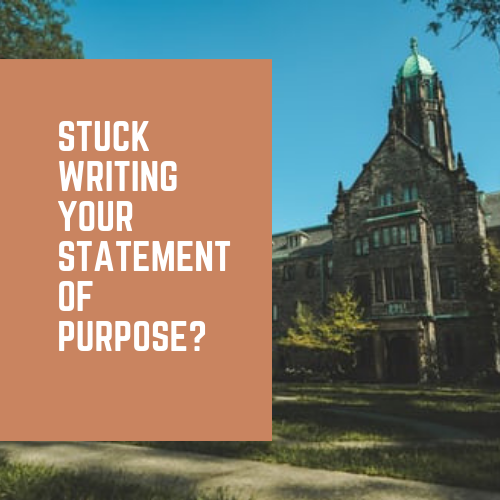
Statement of purpose (SOP) done right! [with Samples]
Statement of Purpose (SOP) or Personal Statement forms a crucial element of the graduate school application process. For the uninitiated, a Statement of Purpose is an essay that introduces YOU to the Admissions Review Committee (AdCom). It contains your accomplishments, career plans, and reasoning of why you think a particular graduate program is the ‘right fit’ for you.
Nearly every respectable graduate program in the world, be it a Master of Science, Engineering Management, MiM or MBA requires applicants to submit a Statement of Purpose while applying.
The AdComs put a lot of value on a candidate’s SOP, evaluating their ‘intent for applying to that program’ and whether it resonates with the University’s mission and objectives.
Jared Pierce, associate director of enrollment services at Northeastern University, says a strong statement of purpose can be the deciding factor in a graduate student’s admission.
“Your statement of purpose is where you tell your story about who you are and why you deserve to be a part of the [university’s] community. It gives the admissions committee the chance to get to know you and understand how you’ll add value to the classroom,” he says.
Clearly then, you will have to construct your statement of purpose which tells your “story” rather than list out your “achievements”
So, how do the applicants go about writing the SOP? Which experiences are viewed favorably by the AdCom, and what should be avoided. In this blogpost, I touch upon the effective strategies that if adopted, can transform your SOP into your story.
STEP – I: Decoding the types
Let’s start by clearing out a few things about the Statement of Purpose. They go by different names — Personal statement, letter of intent, letter of motivation, mission statement, elevator pitch, video sop…. The list is too long! Each of them serves a different purpose and should be written within the frameworks of the university guidelines.
Perhaps the first step you should do before you start writing your SOP is to prepare an outline and use it as a roadmap.
To be honest, this is not a very popular step with most of the students. They imagine that this “extra” step will add time and complicate their application process when in fact, creating an outline can not only help streamline one’s essay writing but can also go a long way in boosting the resulting essays’ effectiveness.

By organizing your thoughts in the form of short phrases and key terms, you will observe that your story unfolds more easily. Moreover, it also ensures that there are no gaps of information in what you are trying to convey. This translates to a more persuasive final SOP and, in most cases, fewer rounds of editing and revision.
Sample Outline A
- Passion for chess – coaching and playing
- Volunteer activities with Greenpeace
- Love of Shah Rukh Khan films
- Managing literature conference at IIT, Mumbai
- Love of biking – Sunday bike rides with “team”
- Semester exchange in France
- Travel to 21 countries – Iceland, Russia and Peru highlights
- Close relationship with grandma
- Budding love of cooking
- Love of Mumbai
Once a sample outline has been prepared, it is now easier to construct a structure for the statement of purpose.
STEP – II: Break it down
Building upon the outline, each SOP needs to be structured so that it logically fits in the narrative.
Many clients that we have encountered confuse ‘structure’ with ‘chronology’. When asked to write a draft of the essay, they present their achievements in chronological order, thinking that this will give the essay a proper structure.
However, your experiences and how they have translated and shaped you into what you are today, may or may not be chronological. Thus, you have to start your essay with the most significant one and connect the dots from there.
The Admissions Review Committee is looking out for very specific things in your application. Unless you break it down, it will be an arduous task to explain them your story. And no one wants a confused AdCom guy in their life.
What is the Admission Committee looking for?
The simple answer would be – what makes you, YOU.
But if only things were so simple. What they are really looking for is how you fit into the overall scheme of things at the University.
Broadly, there are 5 factors they are trying to evaluate you on:
– Why have you applied for that particular program?
– What kind of skills do you have to succeed in that program?
– How do you want to leverage your university connections to network and contribute to the school community?
– How are your professional goals aligned with the program outcomes?
– Why are you the ‘best fit’ for the university?
Your statement of purpose or letter of motivation should talk in brief about all these points.
Even for the most practiced of writers, crafting a successful application essay can be an uphill task. So, trust us on this – Most of the SOPs that we read make us go….

Ideating and then organizing thoughts into outlines for essays will facilitate this process, as we illustrated in Part 1 of this guide, and now we will offer a few basic steps that will help you create and refine your drafts.
STEP- III: Tell your story
As we discussed it earlier, your statement of purpose is not merely an instrument to present facts from your life to the AdCom. Infact, it’s a platform to tell your story. Of who you are, and how has your experiences shaped you. You should therefore focus on narrative writing (which primarily describes) rather than expository writing (which primarily explains). In a narrative, the central facts about a situation are not just bluntly introduced, but are presented in a way that lets them speak for themselves and paint a rounded picture of an experience.

Consider the following examples:
My upbringing in a family full of entrepreneurs made me acquainted to data analytics early in life. When I supported my father’s organization, where they manually used to analyze data and predict delivery date & raw material ordering, I helped them develop an automated system with the use of pivot tables and slicers, that can be used together to visualize data and create easy to use dashboards.
Coming from a business background and having an undergrad degree in Information Technology, it was only natural for me to have a formidable combination of – entrepreneurial streak and technical expertise. My formative years were spent engaging in insightful dining table discussions with my father, pertaining to our business-related products and services. As a result, I was presented with several opportunities to understand the legal, commercial and technical aspects of our business. However, the opportunities that I loved most were the technically challenging ones that had the potential to impact our business positively. One such opportunity that I got was to review and remodel our existing data management system, which had severe limitations in terms of performance and scalability.
Which one of the above example do you think creates a more compelling image of the person you are reading about?
While example A is vague in terms of details, example B has a lot of specifics. It creates a holistic picture of the candidate and evokes imagery for the reader, which is more compelling. Thus, leaving out important details is detrimental to the health of the essay.
STEP – IV: Connect the dots
A good story is as good as its parts. Details, which are crucial to the development of the story, if left out does not reveal the entire picture and leaves the readers confused.
As you write your essay drafts, check each sentence to make sure that it includes a key part of the story you are telling. If you can remove a sentence and your essay still makes sense, that line is unnecessary and should remain deleted. However, if your narrative suddenly becomes unclear, that is your proof that the sentence in question is not superfluous and that you are on your way to creating a profoundly connected narrative.
Having a keen interest in operations research motivated me to work on my bachelor’s thesis: Efficient utilization of weight and volume capacity of a fleet of goods containers. The objective here is to build an algorithmic model for transportation of goods, cargoes, and shipments by utilizing the maximum load and volume capacity of the containers. The study is being carried out with a view to enabling the freight companies in reducing cost and enhancing operational efficiency. I have identified the constraints posed such as categorization of goods according to their suitability, shortest route according to the consignments, delivery of goods within the prescribed time, maximizing the profit and providing customer satisfaction, and successfully developed a mathematical model for the intercity transport, using shortest route and minimum cost per volume using traveling salesman and transportation concepts. Moreover, I am also trying to implement algorithm theory and computational complexity theory to solve the combinatorial problem considering the constraints faced.
Notice how the dots are getting connected.
1st sentence – Having a keen …. – Provides a justification to work on the bachelor’s thesis in Operations Research based on the interest of the applicant.
2nd sentence – The objective here is to build an algorithmic model…. – Clears the aim of the the project and gives idea to the AdCom about the scope of the project.
3rd sentence – The study is being carried out …. – End goal of the project is described.
4th sentence – I have identified the constraints… – talks about problem/constraint identification that the student is trying to resolve
… and successfully developed a mathematical model… -highlights the solution to the given constraints.
Leaving out any sentence written in this paragraph would be eliminating a key detail, and thus will confuse the reader about the project. In short, the story will be difficult to follow.
STEP – V: Create a ‘hook’ in the Introduction paragraph
Sometimes the most difficult part of writing a strong essay is determining the best way to start it. Even when you have a strong outline in hand, crafting those first few words or phrases can be challenging. To help you over this hurdle, we offer a few strategies for beginning your essays.
Maintaining a mystery
This is one of the best ways to grab the attention of the AdCom.
There are only a few rare moments in life, interspersed within our chaotic daily routines, during which we find our true calling. And those moments generally come like a blitzkrieg, inspiring us to make choices which define who we eventually become. I encountered one such moment, as a part of my internship with Bless Foundation, an NGO which strives to alleviate the sufferings of the underprivileged.
(Selected at University of South California, MS in Computer Science).
Do people shape cities or do cities shape people? Irrespective of the order of transformation, I am of the belief that city landscapes impact our daily lives in a significant way.
(Selected at TU Delft, MS in Architecture)
While watching the digitally remastered and coloured version of 1960 Bollywood classic ‘Mughal-e-Azam’, then shot in monochrome, I realised that I was less concerned about the cinematic brilliance but more about certain stats I read about the movie.
(Selected at Cornell University, MPS program in Applied Statistics)
The main stage was set while I enthusiastically waited in the crowd for Guns N’ Roses to surface from behind the spotlight. It was an absolute dream for me to witness the band live in concert, after having grown up and getting inspired by Slash and his musical eccentricities. As they emerged on stage and plucked the first strings, I was transported in a trance of hedonistic pleasure. Surprisingly, it was not the music that had the greatest influence that night.
(Selected at Stanford, MS in Computer Science)
In all of the above examples, the first few lines draw the reader into the essay and make him ask the question, what happens next? This approach is a sure shot way to indulge the AdCom into reading your application in full.
Strictly avoid: Clichés
Let’s be honest here. The AdCom knows when clichés are coming. And no one likes them. Consider this for example:
Being an ardent fan of the Marvel Universe, I believe that if we have the thirst for knowledge, ability to rectify the errors and better our skillset like Ironman and if we have grit, perseverance and will to do good for the mankind like Captain America, then we can win any battle and achieve something great. I tried to follow these ideologies while working on all my projects and technical papers.
My profound interest in mathematics, computers, and problem-solving became the basis for furthering a career in Computer science. In order to broaden my horizons of technical acumen, I joined Oracle after completing my undergrad. This allowed me to develop a clearer vision about pursuing a career in my field of Software Engineering.
It’s safe to say that introductions like these should be avoided at all costs as they have been read by the AdCom a million times. You don’t want to be the million plus one candidate.
Lead with your best
When you are pitching your application to the AdCom, it is highly recommended that you start your essays with your most compelling experience. Do not follow a template of chronological detailing of your academic records and professional achievements. Show your best foot forward. You do not always have to outline your history to create context for your narrative.
Example A (Student Version of her internship)
Due to these rewarding experiences and key learnings acquired from projects, I secured a position as a Developer at Barclays India, which has been exhilarating from the onset. In a span of four months, I underwent intensive training in several technologies like Java, JavaScript, Embedded JavaScript, Spring Framework, Servlets etc.
Example B (Gradsmiths version)
At Barcalays, internship not only meant exposition to multimillion-dollar client portfolio, but also getting intensive training in tools like Java, JavaScript, Embedded JavaScript, Spring Framework, and Servlets.
Example A exhibits significant backstory, but the most important parts that she learned new technologies was mentioned after the third line. In example B, this happens right in the second line, and is smartly packaged for the reader.
This introduction—just one sentence long, rather than four—introduces the reader to the individual’s high- level position right away and is therefore much more compelling and effective.

Step – VI: Don’t put extra information in your essays
Although it seems to be a no brainer, most students end up doing this. They provide irrelevant information in their essay, which makes it a boring read.
Consider this:
My final year project was ‘Analysis and Design of a high rise building with R.C Shear wall’. This project was done by 4 undergrads. In the initial phase, a 3-storied building is designed in ETABS software using Dead and Live load. In the next phase a 15-storied building with shear walls considering Earthquake and wind load is designed under G. A. Bhilare Consultants Pvt. Ltd., Pune. Seismic design parameters like story drift, lateral displacement was studied and shear forces, axial forces, bending moment were interpreted. This project increased my understanding of ETABS and improved my skills .
In the example above, there are too many details like the no. of storey of the building and name of the consultants, which are not required. It adds on to the word count and makes it a slow-developing paragraph.
Revised version
To gain more understanding of structures and the mechanics of forces at play, my final year project focused on the analysis and design of a high rise building with R.C Shear wall. In association with three other undergrads, we worked to design a 3-storied building, followed by its higher version in ETABS software using Dead and Live load. Carefully monitoring the shear walls considering Earthquake and wind load, we studied Seismic design parameters like story drift, lateral displacement. All this culminated under a sponsored industry project in collaboration with top architects of the city. This experience helped me to analyse complex structural models with loads, and design them in the most sustainable way, a skill which I am confident will prove beneficial during my graduate studies.
Step VII: Honour the word limit
Although we can assure you that no one will toss your application in the trash if your essays exceed the school’s stated word limits a little, in general, sticking as closely as possible to these limits is the best plan. Doing so indicates to the admissions committee not only that you pay attention to and can follow directions (which reflects positively on you as a potential student who will be required to follow numerous guidelines throughout the course of the MS program) but also that you are willing to put in the work required to convey your story effectively within the stated parameters. Also, you show respect for the school as well as for the admissions readers, who must sort through thousands of essays each week. A good rule of thumb is to not surpass the school’s requested word count by more than 5%, though of course, the fewer extra words you include, the better—and minimizing any risk of a negative impression resulting from exceeding the set word count is best.
Step VIII: Answer the question
This is our most obvious rule yet, but one that must be stated nonetheless: make sure that you answer the question the school is asking. Sometimes candidates possess a great story and really want to “spin” it for a particular essay prompt. Other times, applicants work and rework an essay so much that when they are done, they do not realize that they have changed their initial story entirely and the resulting essay no longer addresses the school’s question. Not answering the question is one of the admissions committees’ biggest peeves. In addition to indicating an ability to follow directions on your part (if not an outright attempt to withhold information), not answering the question asked means that you have not provided the information the admissions committee is specifically seeking and needs. So, regularly revisit the essay prompts as you revise your essays, ensuring that you are on track and providing a topical response.
Step IX: Customize your responses
It cannot be stressed enough how important it is to customize your essays for your choice of University. Many a times, we have seen that one SOP is sent to 5 different universities, with just a few line changes.
To us, this is a very easy and a lazy approach to essay drafting. Moreover, the AdCom through their years of experience of reading SOPs figure out whether you have followed a template or not.
Your short and long term goals should be aligned with the research areas and expertise of the University. AdCom loves to see how the university can help you realize your personal and professional milestones.
A common point of contention among students is whether or not to include the names of professors. In our opinion, you should go beyond name-dropping and identify key research areas where you would like to work. This creates a better representation of your academic interest and underlines your motivation to apply for the program.
It is important to understand that the AdCom is looking for unique and interesting candidates, who contribute to the campus and community. Thus, desire to work in student clubs, campus organizations, or community service is viewed positively. It shows that you have a multi-dimensional personality and go beyond your academic interests. Another quirky thing to add is why the location of the college is important to you and your goals. It can be the vibrant startup culture of the place, proximity to tech centers or Silicon Valley, or even the music vibe of the place.
Step X: Read, Re-read, Proofread. Repeat.
If you have followed all the steps above, and drafted your statement of purpose, great work done! Now will be a good time to send it to your friends, relatives, colleagues, and anywould who would care to read it.
You will amazed at how many grammatical errors get discovered. And we don’t even want to get started on the formatting bits.
Your goal, before sending out your statement of purpose should be to make it as error-proof as possible. This can be achieved by proofreading it multiple times to check for nasty little bits of flaws that hides furtively behind the pompous words and achievements.
The Statement of Purpose is perhaps the hardest thing you will encounter during your application stage.
The good news is that the process does not seem so overwhelming when you break it down into simple, actionable steps as described above.
At Gradsmiths, we have come across more than a thousand essays and SOPs, some brilliant while some total disasters. What really saddened us was that the same mistakes were being repeated in every other document, which motivated us to compile these steps that we follow into this post to draft an awesome statement of purpose.
Statement of Purpose (Samples and formats)
Statement of Purpose that got accepted to UPenn MS in Computer Science
Sample Statement of Purpose that got accepted to MS in Mechanical Engineering, Arizona State University
Statement of Purpose that got accepted to Cornell University’s Engineering Management program
Enjoyed the blog? Why not drop in your e-mail address below, and we send more such tips and strategies straight to your mailbox.
WE DON’T SPAM.
If you have got the time, do check out our FREE E-book on ‘Biggest Mistakes you make in your resume’. It contains some super pointers on how to modify your resume and make it fit for a graduate school application.

Interested in talking to a Gradsmiths expert on how to go about your essays? Book your calendar here.
2 thoughts on “Statement of purpose (SOP) done right! [with Samples]”
Pingback: Mechanical Engineer (1.5 years Work Exp) goes to Columbia Business Analytics program – GRADSMITHS
Comments are closed.
We're sorry but you will need to enable Javascript to access all of the features of this site.
Stanford Online
How to write a compelling statement of purpose for graduate school.

A statement of purpose (SOP) is a critical component of most graduate school applications, and are often required for various types of graduate level programs, including Graduate Certificates and Master’s Degrees .
An SOP offers you the opportunity to showcase your motivations, qualifications, and aspirations to a school’s Office of Admissions. Crafting an effective SOP requires careful planning and attention to detail. Whether you're applying to Stanford or any other institution, here's a guide on how to write a standout statement of purpose that shows how your goals align with the program's expectations.
Understanding the Prompt
A prompt's comprehensive nature offers you the chance to provide a holistic view of your journey, motivations, and aspirations. Be sure to check the websites of any programs you’re applying to, as they often have additional information or suggested frameworks to get you started.
Stanford Master’s Degree
If you are applying to a Stanford master’s degree program , the recommended maximum length for your SOP is 1,000 words and the prompt for the statement of purpose emphasizes several key elements:
- Reasons for applying
- Preparation for the field of study
- Research interests
- Future career plans
- Relevant aspects of your background
Stanford Graduate Certificate
If you are applying to take individual graduate courses or pursue a graduate certificate through Stanford Online, the prompt contains less elements than for the master’s program. This statement of purpose should be brief, as you’re limited to 4000 characters. You should summarize:
- Specific course work on your transcript that meets the course and or certificate prerequisites
- Relevant aspects of your professional experience
Tips for Writing your Statement of Purpose
After you fully understand the prompt for the program you’re applying to, use these tips to guide your writing:
- Be Concise and Focused Most institutions have maximum lengths for words or characters. With limited space, it's important to be concise and focused. Use each word purposefully to convey your message. Ensure that every paragraph adds value and contributes to your overall narrative.
- Start Strong Your opening should be attention-grabbing. Consider sharing a personal anecdote, a relevant quote, or a thought-provoking question that sets the tone for your SOP. Engaging the reader from the beginning can make your statement more memorable.
- Address the Prompt Thoroughly Cover each aspect of the prompt thoroughly, addressing your reasons for applying, your background preparation, your research interests, and your future career plans. Use specific examples to illustrate your points. For instance, if you're applying to a computer science program, discuss projects, coursework, or experiences that highlight your passion and readiness for further study in this field.
- Showcase Fit with the Program Demonstrate a clear understanding of the program you're applying to and explain why it's an ideal fit for your academic and career goals. Highlight specific courses, professors, research opportunities, or unique features of the program that attracted you. This showcases your commitment to the program and demonstrates that you've done your research. You may consider including reasons your presence will benefit the program as your uniqueness may help set you apart from other applicants.
- Highlight Research Interests Discuss your research interests in detail. Explain how your past experiences have shaped your interests and how the program's resources can help you further develop them. Share any relevant research projects you've been a part of and explain their impact on your academic journey. If your program includes a capstone, you may want to include more actionable, compelling examples.
- Connect to Your Future Career Articulate your future career plans and explain how the program will prepare you for success. Whether you plan to pursue academia, industry, or another path, convey how the skills and knowledge gained from the program will contribute to your career trajectory.
- Weave in Personal Background Share aspects of your personal background that are relevant to your journey. This could include challenges you've overcome, experiences that have shaped your perspective, or unique qualities that set you apart. Ensure that these details contribute to your overall narrative and that adding them showcases your qualifications.
- Edit and Proofread After writing your SOP, review it meticulously for grammar, punctuation, and clarity. Typos and errors can detract from the impact of your statement. Consider seeking feedback from mentors, professors, or peers to ensure your SOP effectively conveys your message.
- Tailor for Specific Programs If you're applying to multiple programs, make sure to customize each SOP to align with the specific program's offerings and requirements. Avoid using a generic SOP for all applications, this tends to be very noticeable to admissions.
- Seek Inspiration from Examples If you’re applying to a Stanford Master’s program, the Stanford Graduate Admissions website provides specific guidance on the statement of purpose. Review your program’s recommendations and, if available, consider reading sample SOPs from successful applicants to gather inspiration and insights.
Writing a compelling statement of purpose for graduate school requires thoughtful reflection, careful planning, and clear communication. By addressing the prompt comprehensively, showcasing your fit with the program, and demonstrating your passion and readiness, you can craft an SOP that stands out and may even increase your chances of admission to your desired program. Although it’s far from the only criteria that will be considered in the admissions process, your SOP is your chance to tell your unique story and show why you are a perfect candidate for graduate study. We hope you find this guide useful as you write your statement of purpose, please know that following this guide does not guarantee your admission to any program.
- Engineering
- Artificial Intelligence
- Computer Science & Security
- Business & Management
- Energy & Sustainability
- Data Science
- Medicine & Health
- Explore All
- Technical Support
- Master’s Application FAQs
- Master’s Student FAQs
- Master's Tuition & Fees
- Grades & Policies
- Graduate Application FAQs
- Graduate Student FAQs
- Graduate Tuition & Fees
- Community Standards Review Process
- Academic Calendar
- Exams & Homework FAQs
- HCP History
- Enrollment FAQs
- Tuition, Fees, & Payments
- Custom & Executive Programs
- Free Online Courses
- Free Content Library
- School of Engineering
- Graduate School of Education
- Stanford Doerr School of Sustainability
- School of Humanities & Sciences
- Stanford Human Centered Artificial Intelligence (HAI)
- Graduate School of Business
- Stanford Law School
- School of Medicine
- Learning Collaborations
- Stanford Credentials
- What is a digital credential?
- Grades and Units Information
- Our Community
- Get Course Updates

How To Write a Statement of Purpose for Graduate School

Congratulations! You’ve chosen a graduate program , read up on tips for applying to grad school , and even written a focused grad school resumé . But if you’re like many students, you’ve left the most daunting part of the application process for last—writing a statement of purpose. The good news is that the task doesn’t have to feel so overwhelming, as long as you break the process down into simple, actionable steps. Below, learn how to write a strong, unique statement of purpose that will impress admissions committees and increase your chances of getting into your dream school.
What is a statement of purpose?
A statement of purpose (SOP), sometimes referred to as a personal statement, is a critical piece of a graduate school application that tells admissions committees who you are, what your academic and professional interests are, and how you’ll add value to the graduate program you’re applying to.
Jared Pierce, former associate director of enrollment services at Northeastern University, says a strong statement of purpose can be the deciding factor in a graduate student’s admission.
“Your statement of purpose is where you tell your story about who you are and why you deserve to be a part of the [university’s] community. It gives the admissions committee the chance to get to know you and understand how you’ll add value to the classroom,” he says.
How long should a statement of purpose be? “A statement of purpose should be between 500 and 1,000 words,” Pierce says, noting that it should typically not exceed a single page. He advises that students use a traditional font at a readable size (11 or 12 points) and leave enough white space in the margins to make the statement easy to read. Make sure to double-space the statement if the university has requested it, he adds.
How to write a statement of purpose: a step-by-step guide
Now that you understand how to format a statement of purpose, you can begin drafting your own. Getting started can feel daunting, but Pierce suggests making the process more manageable by breaking down the writing process into four easy steps.
1. Brainstorm your ideas.
First, he says, try to reframe the task at hand and get excited for the opportunity to write your statement of purpose.
“Throughout the application process, you’re afforded few opportunities to address the committee directly,” he explains. “Here is your chance to truly speak directly to them. Each student arrives at this process with a unique story, including prior jobs, volunteer experience, or undergraduate studies. Think about what makes you you and start outlining.”
When writing your statement of purpose, Pierce suggests asking yourself these key questions:
- Why do I want this degree?
- What are my expectations for this degree?
- What courses or program features excite me the most?
- Where do I want this degree to take me, professionally and personally?
- How will my unique professional and personal experiences add value to the program?
Jot these responses down to get your initial thoughts on paper. This will act as your starting point for creating an outline and writing your first draft.
2. Develop an outline.
Next, you’ll want to take the ideas that you’ve identified during the brainstorming process and plug them into an outline that will guide your writing.
An effective outline for your statement of purpose might look something like this:
- An attention-grabbing hook
- A brief introduction of yourself and your background as it relates to your motivation behind applying to graduate school
- Your professional goals as they relate to the program
- Why you’re interested in the specific school and what you can bring to the table
- A brief summary of the information presented in the body that emphasizes your qualifications and compatibility with the school
An outline like the one above will give you a roadmap to follow so that your statement of purpose is well organized and concise.
3. Write the first draft.
Your statement of purpose should communicate who you are and why you are interested in a particular program, but it also needs to be positioned in a way that differentiates you from other applicants.
Admissions professionals already have your transcripts, resumé, and test scores; the statement of purpose is your chance to tell your story in your own words.
When you begin drafting content, make sure to:
- Provide insight into what drives you , whether that’s professional advancement, personal growth, or both.
- Demonstrate your interest in the school by addressing the unique features of the program that interest you most. For Northeastern, he says, maybe it’s experiential learning; you’re excited to tackle real-world projects in your desired industry. Or perhaps it’s learning from faculty who are experts in your field of study.
- Be yourself. It helps to keep your audience in mind while writing, but don’t forget to let your personality shine through. It’s important to be authentic when writing your statement to show the admissions committee who you are and why your unique perspective will add value to the program.
4. Edit and refine your work.
Before you submit your statement of purpose:
- Make sure you’ve followed all directions thoroughly , including requirements about margins, spacing, and font size.
- Proofread carefully for grammar, spelling, and punctuation.
- Remember that a statement of purpose should be between 500 and 1,000 words. If you’ve written far more than this, read through your statement again and edit for clarity and conciseness. Less is often more; articulate your main points strongly and get rid of any “clutter.”
- Walk away and come back later with a fresh set of eyes. Sometimes your best ideas come when you’re not sitting and staring at your computer.
- Ask someone you trust to read your statement before you submit it.
Making a lasting impression
Your statement of purpose can leave a lasting impression if done well, Pierce says. It provides you with the opportunity to highlight your unique background and skills so that admissions professionals understand why you’re the ideal candidate for the program that you’re applying to. If nothing else, stay focused on what you uniquely bring to the classroom, the program, and the campus community. If you do that, you’ll excel.
To learn more tricks and tips for submitting an impressive graduate school application, explore our related grad school success articles .
Need more application help?
Join one of our application workshops to get your questions answered.
Register here
Editor’s note: This article was originally published in March 2017. It has since been updated for thoroughness and accuracy.
Subscribe below to receive future content from the Graduate Programs Blog.
About shayna joubert, related articles, grad school application advice: what prospective students need to know.

5 Expert Tips for Writing a Stand-Out Grad School Resumé

How To Request a Grad School Recommendation Letter
Did you know.
Advanced degree holders earn a salary an average 25% higher than bachelor's degree holders. (Economic Policy Institute, 2021)
Northeastern University Graduate Programs
Explore our 200+ industry-aligned graduate degree and certificate programs.
Most Popular:
Tips for taking online classes: 8 strategies for success, public health careers: what can you do with an mph, 7 international business careers that are in high demand, edd vs. phd in education: what’s the difference, 7 must-have skills for data analysts, in-demand biotechnology careers shaping our future, the benefits of online learning: 8 advantages of online degrees, the best of our graduate blog—right to your inbox.
Stay up to date on our latest posts and university events. Plus receive relevant career tips and grad school advice.
By providing us with your email, you agree to the terms of our Privacy Policy and Terms of Service.
Keep Reading:

Top Higher Education Conferences To Attend in 2024

Grad School or Work? How To Balance Both

Is a Master’s in Computer Science Worth the Investment?

Should I Go to Grad School: 4 Questions To Consider
- Skip to main content
- Prospective Students
- Current Students
- Apply Apply
- Follow Us

How to Write a Statement of Purpose for PhD Admission

The dreaded doctoral statement of purpose — every PhD program asks for it, but why is it so difficult to write? Writing a strong statement of purpose is essential to getting into your top PhD programs. A PhD statement of purpose gives admissions committees an introduction to your research interests and why their specific program is of interest to you.
Like a cover letter for a job application, a great statement of purpose allows you to highlight your strengths, interests and experience. If you need statement of purpose advice, keep reading for guidance on how to write a successful statement of purpose that will make your PhD application stand out.
Statement of purpose vs. personal statement
Though the two may sound similar, they’re not necessarily interchangeable. A personal statement gives insight into who you are, while a statement of purpose is meant to showcase what you want to do. Rarely will you be asked to write a personal statement for a PhD program.
As you go through the PhD application process, you will likely see schools requesting either a statement of purpose or a research statement. In most cases, they're both looking for the same thing. Admissions committees want to know about your academic background, your research goals and what you hope to accomplish as a candidate in a PhD program.
Your research goals should align with faculty research
Being admitted to a PhD program is a great feeling, but if you enroll in a program that doesn’t match your research interests or help support your career goals, you may be setting yourself up for disappointment later down the road.
Applying for admission to a program is all about fit. Faculty reviewers are looking for students who best represent the department’s mission and will help them obtain their research objectives.
By the time you apply, you should have a solid understanding of what the department’s primary research and content areas are, as well as which faculty members you’d like to work with more closely. This might mean finding information about what their labs do and reading published articles related to their work.
Be sure to include how your interests and past experiences align with the work that they do and how you would be an active contributor to those endeavors. This approach shows that you took the time to look into their program, so the committee will be more willing to invest theirs in reviewing your application.
Don’t be afraid to address your weaknesses
Many people assume they should avoid listing their shortcomings in their essays. The whole point of applying to a program is to impress the reviewers, right? But constructively addressing your weaknesses can be a great way to demonstrate how this program can help you achieve your academic goals.
Look at the catalog and read through the courses that are part of the program. If there is a particular class that fascinates you, talk about how it could help you obtain a new skill or a better understanding of a concept that you’ve struggled with before.
This demonstrates that you are actively seeking programs to help you better your education. It also exhibits that you’re mindful of what areas of your knowledge need some improvement, which shows maturity and the ability to self-assess.
Keep it succinct
If your program of interest does not specify a page word or word limit, it’s best to assume that your statement should not exceed two pages total. It should be enough to give them a glimpse of who you are and what you have to offer but not share your life story.
The aim is to communicate how and why this particular program will help you meet your academic and career goals. Limited space means you must prioritize what you include in your statement.
Create an outline before you start writing to ensure you are including points that are relevant to your application and the program to which you are applying. Your statement is also an example of how well you can write. By framing your essay before you write it, you can avoid stream-of-consciousness writing that can often come across as undefined and incoherent.
Proofread! And read it over and over
When you think you have a finished product, read your essay out loud. This makes it easier to catch typos, poor grammar, and oddly worded sentences. If you have a friend who is also applying to grad school, help each other out by editing each other’s essays.
Having someone else read your statement and ask questions can help you clarify your points and make it more compelling. Your statement is your one chance to present yourself professionally in your own words. The occasional mistake is excusable, but messy writing will make them think you lack attention to detail.
Before you hit submit on that application, be sure that you have attached the correct document for the right institution. It can be very embarrassing if your statement mentions the wrong faculty member’s name or refers to another school’s library! It could also cause the reviewers to think you are not as serious about their program.
You’ve spent a good amount of time perfecting your application, so take your time to review everything before you submit it so you can rest easy knowing you’ve presented your best.

Get tips and learn more
about how to apply to a PhD by reading our guide on Choosing, Applying for, and Thriving in a PhD Program!

Request more
Information.
Complete the form to reach out to us for more information
Published On
More articles, recommended articles for you, beyond the tenure-track but still in the heart of academia.
As a student who is entering or completing a Ph.D. program, you're probably thinking about the...
5 Tips for Writing Your Ph.D. Dissertation
Somewhere around the end of the first year of your Ph.D. program, you will probably start (or have...
Alumni Spotlight: Kelsey Kiser
Future SMU grad students, meet an SMU PhD graduate 👋
Kelsey Kiser shares her journey from an...
Browse articles by topic
Subscribe to.

Statement of Purpose for Graduate School
Criteria for success.
- qualified for their program, and
- a good fit for their program’s focus and goals.
- You show a select group of skills and experiences that concisely convey your scientific accomplishments and interests.
- Your experiences are concrete and quantitative .
- Your personal statement is no more than 2 pages (less if you can, or if it is required by the school).
Structure Diagram
The graduate school Personal Statement (≈ Statement of Purpose ≈ Statement of Intent) is a document that complements your resume and application form, describing your profile in a narrative way and convincing the admission committee that you would be a good match for a particular department or program. Take into account that matching goes both ways: they should be interested in you, and you should be interested in them. Your personal statement should make this match clear.
Analyze Your Audience
Your personal statement will be read by a graduate committee – a handful of faculty from the program. They’re trying to determine if you will be a successful graduate student in their department and a successful scientist after you graduate. They are interested in your qualifications as a researcher, your career goals, and how your personality matches their labs and department.
The graduate committee probably reads hundreds of applications every year. To make it easy for them to figure out that you are a good fit, keep in mind the following suggestions:
- Make direct, concrete statements about your accomplishments and qualifications.
- Create a narrative that serves as a personal brand and helps them remember you.
- Give them some unique examples that describe you and make you stand out, and which will make them remember you as “that candidate that was so passionate about…” or “who has a lot of experience in…”, although they might not remember your name.
- Align your academic goals and motivations with specific research projects or research directions of the target department.
Assessing your match to the target program
A key point on writing your Personal Statement is to demonstrate that you have done previous research about the program to which you’re applying, that you understand its characteristics and objectives, and that you are really interested in joining it and willing to do your best to be successful in it. To do this:
- Read the program’s website. Learn about its faculty members and the projects they are working on. Check what topics and high level goals the department is committed to. Identify the main research areas.
- Get in contact with faculty and students in your target program. Browse recent publications and presentations but remember lab websites can be outdated and a publication may lag a few years behind the active research in a lab so pay attention to the motivation, direction, and methods of the faculty member over specific results. If you have had a positive discussion with someone at the department, you can include in your essay how those interactions confirmed that you would be a good match for the program.
Reflect before you start
To convince a graduate committee that you are ready for and excited about graduate school, first you need to be able to articulate this to yourself. Earnestly reflect on the following types of questions. A lack of authenticity is easy to detect.
- Why do I want to go to graduate school?
- How am I sure?
- Why will I be successful in graduate school?
- What can I do with the help of this degree that I couldn’t do before?
- Where do I want to be in a few years?
- How am I going to get there?
Create a personal narrative
Graduate programs invest in the professional and scientific growth of their students. Get the committee excited about investing in you by opening your essay with a brief portrait of what drives you as a scientist. What research directions are you passionate about, and why? What do you picture yourself doing in 10 years?
- E.g. “Graduate study is the first step towards my goal: I want to improve my ability as a researcher and gain more technical depth and breadth to maximize my impact. In the long term, I hope graduate school will better position me to be a leader in shaping the conversation about what problems can be addressed by mechanical engineers.”
Close your essay with a 2-3 sentence discussion of your long-term career interests. No one will hold you to this; this just helps your committee visualize your potential trajectory.
- E.g. “Above all else, a MIT PhD would help me achieve my long term career goal of becoming a professor, the position in which I can best see myself accomplishing my mission to show others the hidden beauty in everyday life through science.”
Connect your personal narrative to whichever degree you are applying to (be it research-based or course-work-based, or a Master of Science, Master of Engineering, or PhD). Especially in mechanical engineering, each of these degrees will enable different career trajectories and provide different educational opportunities. Articulate clearly why the degree you are applying for helps you achieve your goals. In the same vein, consider mutual benefit: what will you contribute to the academic community over your time at your target school? Remember, it all comes back to “qualified match” , no matter what level of degree you are applying for.
Describe your experiences
Experiences are the “what” of your essay. They are the most efficient and easiest way to prove your capabilities to the admissions committee.
- What experiences led you to develop your skill set and passions ?
- Where have you demonstrated accomplishment, leadership, and collaboration?
- Show your depth with a range of experiences: research, teaching, relevant extracurriculars and leadership positions.
- State concrete achievements and outcomes like awards, discoveries, or publications, or projects completed.
Achievements need not be limited to research projects or publications. Think about all the experiences that demonstrate your ability to conduct research and succeed within the structure of your target program. (Where have you demonstrated creativity? Self sufficiency? Perseverance? What open ended problems have you tackled? What enabled you to succeed at them?)
Quantify your experiences to show concrete impact. How many people were on your team? How many protocols did you develop? How many people were in competition for an award? As a TA, how often did you meet with your students?
| As a senior, I received an A in a graduate-level Structure Mechanics course. | My interest in structural analysis led me to take advanced coursework to learn more about steel structures. At the graduate-level Structural Mechanics course, I learned about joints design which boosted my interest in… |
| During my third year, I worked on a project for my Hydrology class that made me get interested in numerical modelling. | During my third year, I had the chance to conduct a research-oriented class project about the hydrology of the Mississippi river and the impact of global warming in its regime. In this project, I ran a hydrological numerical model using the open source software … While working on this project, I was faced with the difficulty of getting updated topographic data of the study area. I managed to overcome this issue by… |
| I volunteered for the Campus Preview Weekend for the last three years. At this position, I demonstrated my leadership and management skills. | Committed to being a great ambassador of our residence hall, I volunteered for the Campus Preview Weekend for the last three years, scheduling events within our dorm, then welcoming the prospective students as they arrived and directing them and their parents around campus to the activities we had planned. This experience allowed me to gain training on dealing with time constraints and a large group of people. Last year, for example…. |
For each experience you include, focus on how the experience affected you. Describe your actions, and always direct the message to highlighting your performance and growth (not how important the company was or how well-known the professor you TAed for is). Remember, it is not an essay about science, it is a personal essay—about you and how you have positioned yourself to succeed in graduate school.
Explain the meaning of your experiences
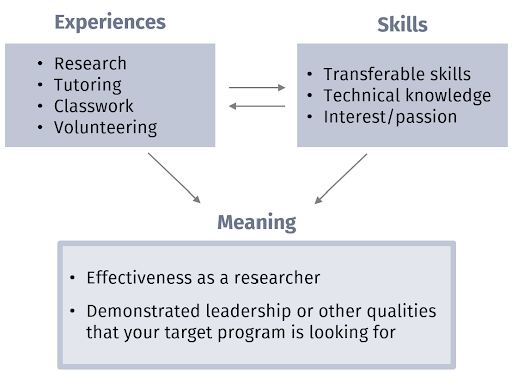
Your goal in sharing your experiences is to demonstrate that you have the qualifications, qualities, and drive needed to succeed in graduate school. Therefore, you will need to not only choose experiences wisely but also state specifically what they mean within the context of your application.
- Why was this experience important to your growth as a scientist?
- What did you gain from or demonstrate during that experience?
- How will this make you a better grad student?
Even if it feels obvious to you, you need to explicitly answer these questions to your audience. Here are some examples experiences that have been expanded to contain meaning:
| “As a senior, I received an A in a graduate-level CFD course.” | “My advanced coursework demonstrates my ability to thrive in a challenging academic environment. A graduate-level computational fluid dynamics course challenged me to…” |
| “I independently developed a digital data acquisition software for gamma spectroscopy.” | “My research experiences have developed my problem-solving abilities. When the commercial software was insufficient for my gamma spectroscopy project, I … This has given me the confidence and software skills to attack open-ended research problems.” |
Contemplate how disparate activities can be unified into a common narrative about your motivations and achievements. Articulate this clearly to make your statement cohesive.

Demonstrate your match to the target program
Using the research you did to assess your chosen programs, clearly articulate why you are a match . Consider both directions of the match: not only why you want to go to the school, but also why you would fit in well and contribute to the program.
State which professors in the program you would be interested in working with. Demonstrate that you have done your homework regarding the program. Show how their research areas align with your background and your goals. If you have had conversations with students or professors in the program, be sure to include that as well.
Common Pitfalls
Write about you , not your role models. One of the most common pitfalls we see in the Comm Lab is students writing touching Personal Statements about family members or role models who have inspired them. There is nothing wrong with including personal stories about people who have helped you understand yourself better, or positioned you to succeed in graduate school, but it is important to tread very carefully. Don’t leave the reader wondering why they are reading about someone else in a document that is meant to be about you. If you take time to talk about someone who positively affected you, make sure to be very clear about how that experience with that person molded you into a strong graduate school candidate.
Be judicious with childhood stories. A brief mention of some childhood experience that shaped your interests in STEM is probably okay, but if you talk about it at length (more than ~2 sentences), you are taking up space that should probably be used to talk about who you are today, not who you were over a decade ago.
Don’t simply restate your resume. Your Personal Statement should be a technical document (having evidence, numbers, and supporting facts) with personal outcomes (talking about your motivations, ambitions, and ability to succeed as a graduate student). Of course, you will reiterate parts of your resume in your Personal Statement , but what uniquely makes it a “Personal Statement” is the discussion of how those professional experiences affected you , as a researcher and person well-suited to the graduate program at X University.
Insufficient quantification of your experiences. We are all scientists and engineers; our line of work is inherently quantitative. Quantification is a quick and easy way to add context, lend credence to your experiences, and impress the reader. Even little quantifications can help: “I spent two semesters working on a project about…” is much better than “I spent some time working on a project about…”. See more examples in the section on Experiences, above.
Being a great student and having an impressive resume is only half the battle when it comes to graduate school applications. You need to be able to communicate and convince the committee that your personality and particular set of skills and experiences are well-suited to the graduate program you are applying for. This extends beyond graduate school applications: as scientists and engineers, we write papers and technical reports to communicate with our peers and convince them that our work is meaningful.
By reading this article, you have recognized the value of communication and are well on your way to crafting an effective and powerful Personal Statement. This is your opportunity to make yourself shine among all the other candidates, so make it count! You can do it!
Acknowledgements : This content was adapted from the NSE and CEE Communication Labs’ CommKits for graduate applications.
Resources and Annotated Examples
Annotated example 1, annotated example 2.
- Skip to main content
- Skip to footer
Additional menu

The Art of Applying®
MBA Admissions Consulting | MPP & MPA Admissions Consulting | Harvard Application Advice
PhD Series: How to Write a Statement of Purpose
posted on July 28, 2021
What is a Statement of Purpose?
A Statement of Purpose goes beyond the traditional Personal Statement. It asks applicants to not only describe their professional journey and how that led to their research interests, but also offer additional insight into their proposed area of study. This article offers a useful framework for writing your Statement of Purpose as well as tips to get you started.
Step 1: Introduction and Outline of Goals
The first section of the Statement of Purpose should include a broad overview of your academic interests as well as a brief outline of your short term and long-term goals. Introducing your interests and goals early frames the rest of the essay for the reader, and more importantly, answers the prompt.
Step 2: Relevant Academic History
Describe relevant academic or work experiences in detail and how they have shaped your desire to pursue a graduate degree in your proposed field. A common mistake made by applicants is providing a detailed account of every single past experience in their Statement of Purpose. While certainly comprehensive, it is not necessary, and can reflect poorly on the applicant, especially if it excludes or dilutes other essential components of the essay. Instead, consider including 3-5 of your most impactful experiences. Describe the projects in detail, skills you developed, lessons learned, and any outcomes. For example, for a research project involving human subjects, you could describe the process of obtaining IRB approval, developing and validating a survey, or mixed methods data analysis. PhD programs are rigorous. Convince the selection committee that you “know what you are getting into,” that you have the knowledge and resilience to be successful in their PhD program.
Step 3: Next Steps and “Why X” Program
Here, describe your research interests, detailing potential projects, research aims and methodologies. Discuss potential mentors at the institution you would like to work with (the buzzword here is “mentoring team”), and the specific skills you will learn from each of them. If done correctly, this section has the most potential to set you apart from other applicants.
Writing a Statement of Purpose that is both comprehensive and concise can be challenging. Before you begin, outline your essay using the above sections, paying close attention to your overarching goals. Do your past experiences clearly explain what brought you to your proposed field of interest? How will pursuing a PhD help you achieve your future goals? Connect the dots for your readers.
Need more guidance with your Statement of Purpose essay? The Art of Applying® is here to help. Our experienced team of consultants have trained at the top academic institutions in the world and more importantly, are dedicated to your success. To learn more about how we can help, click here to schedule your 15-minute Quick Call .
Reader Interactions
Leave a reply cancel reply.
Your email address will not be published. Required fields are marked *
Save my name, email, and website in this browser for the next time I comment.
Notify me when my comment has been responded to
This site uses Akismet to reduce spam. Learn how your comment data is processed .
Ready to take your next step?
Get admitted. Land a scholarship. Make an impact.
Learn More --> Get Started Today
Claim your free Purpose Packet Now
We will not spam, rent, or sell your information.
Register Your Spot Now
Just enter your name & email to secure your spot.
Get Clear on your Goals Goalwork
- Full Name *
- Email Address *
- Yes, please add me to the list!
- No, I don’t want to be added to the mailing list.
ALMOST THERE! PLEASE COMPLETE THIS FORM TO GAIN INSTANT ACCESS
ENTER YOUR EMAIL ADDRESS TO GET STARTED
- First Name First
- Last Name Last
I consent to register for this webinar and receive information about products and services from this webinar presenter per The Art of Applying Privacy Policy.
Sample College Resume
- No, I don't want to be added to the mailing list.
Sample of an Essay Topic Inventory
- First Name *

- Meet Kaneisha
- Meet Our Team
- Testimonials
- Wall of Fame
- Client Interviews

8 Tips for Writing a Statement of Purpose
The statement of purpose, sometimes called a personal statement, is an essential part of PhD applications. It functions similarly to a cover letter; it should convince the reader (in this case the selection committee) that you have the right qualifications, motivation and professional goals to pursue graduate studies in their program. Use the tips below to write a statement of purpose that stands out.
This first tip is the most important. It is essential that you customize your statement of purpose to every school, program, or project that you apply to. You don't have to start from scratch for each statement of purpose, but you should make sure that significant portions of the document are school-specific. Your statement of purpose should tell the committee why you chose to apply to their school over other options.
Show Your Qualifications
Explain why you are qualified for this PhD program. Include a brief summary of your undergraduate and previous graduate career (if applicable). Talk about the research projects you conducted and your thesis or any resulting publications. Mention any relevant scholarly extracurricular activities you were involved in. If there are special requirements for the program, such as foreign language proficiency or prerequisite courses, you should explain how you fulfilled them in your statement of purpose.
Explain Your Interests
Your research interests should be a major part of your statement of purpose. Set up the topic you want to research by indicating a theme, defining a problem, or posing a question. Talk about what inspired your interest in this topic and how it will contribute to the field and the current state of scholarship.
Show Them You Belong
Your statement of purpose should connect your research interests to the school you are applying to. You should name professors with parallel interests who you would like to work with and use specific examples of their work to explain why. Be explicit about how this school will help you succeed in your research goals. Is the department known for taking a unique approach or having a strong focus in a particular area? Do they have special access to resources that will help you research? This paragraph will have to be tailored to each school you apply to.
Unless a specific word count is mentioned in the application, the statement of purpose should not be longer than one to two pages. Make every word count.
Don’t Tell Your Life Story
On a similar note, avoid excess storytelling in your statement of purpose. Don’t waste your limited space telling the committee how you’ve always wanted to be a physicist or about the moment that sparked your passion for history. They already know you’re passionate about the subject—you wouldn’t be applying for a PhD if you weren’t! While your past achievement have prepared for this PhD program, the statement of purpose should focus on your future as a scholar.
Ask For Feedback
When you have written a draft you are satisfied with, ask one of a professor in your field who knows you and your interests to read it over. They can help you see your statement of purpose from the perspective of someone with experience on admissions committees.
This is the crucial last step for any application. Read your statement of purpose over several times to make sure there are no typos or grammatical errors. It can be hard to spot errors on the screen, so print out your statement and read it over. Double check that you have spelled the professors’ names and titles of their work correctly. If grammar isn’t your strong suit (or even if it is) it’s a good idea to ask someone else to proofread your statement of purpose as well.
Discover related jobs
Discover similar employers
Accelerate your academic career
How to Answer Common Interview Questions
Make sure you’re ready to impress the interviewer with these answers to ...

Moving to Denmark to Research or Study
Denmark attracts thousands of students and researchers each year. Here a...
How to Prepare for a PhD Interview
A PhD interview is an opportunity to show the committee who you are, wha...
Moving to Luxembourg to Research
Luxembourg has long been known as a leading European financial centre, b...
9 Strategies to Overcome Writer’s Block
Here are some strategies to help you get the words flowing again.
PhD, Postdoc, and Professor Salaries in Denmark
Interested in working in Denmark? Learn how much PhD students, postdocs,...
Jobs by field
- Electrical Engineering 189
- Programming Languages 172
- Molecular Biology 158
- Artificial Intelligence 158
- Machine Learning 151
- Materials Engineering 144
- Cell Biology 133
- Computational Sciences 130
- Materials Chemistry 128
- Biochemistry 125
Jobs by type
- Postdoc 339
- Assistant / Associate Professor 159
- Professor 111
- Researcher 97
- Research assistant 92
- Engineer 76
- Lecturer / Senior Lecturer 63
- Management / Leadership 58
- Tenure Track 39
Jobs by country
- Belgium 300
- Netherlands 194
- Morocco 127
- Germany 126
- Switzerland 98
- Luxembourg 82
Jobs by employer
- Mohammed VI Polytechnic Unive... 131
- KU Leuven 127
- University of Luxembourg 81
- Eindhoven University of Techn... 67
- Ghent University 51
- ETH Zürich 47
- Leiden University 44
- Silicon Austria Labs (SAL) 43
- University of Twente 37

Some of these samples have been accepted by top programs. They have been graciously shared by past applicants for educational purposes. We hope they inspire you to write your own.
Drop us a draft of your SOP, PS, LOI, ML, &/or LOR for
- Expert 1 v 1 Guidance (includes reviewing and editing)
- Review and edit
Most reviewed programs
- MS and PhD in Computer science, Data Science, AI, Engineering (MIT, Stanford, Carnegie Mellon, Georgia Tech, Caltec, etc)
- Mathematics
- Biomedical Engineering
- Linguistics and literature
- Film studies
PLACE ORDER
Statement of Purpose for PhD in Computer Science (MIT Accepted)
We analyse three SOP samples, two accepted at MIT and one at the University of Washington.
Statement of Purpose for PhD in Biomedical Engineering (MIT Accepted)
In this article, we analyse a Biomedical Engineering SOP that was accepted at MIT, Stanford, and Georgia Tech
Letters of Recommendation: A Guide and Sample for your Recommenders
Statement of Purpose Sample for Nursing (Undergraduate) (Highly rated)
Description: We describe in detail how to write a statement of purpose for nursing. In the SOP, the applicant underscores the areas of nursing she’d focus on and how she was suited for the school.
Statement of Purpose Sample for Ph. D Nursing (Compelling)
Description: In this Statement of Purpose Sample for Nursing Ph. D, the applicant identifies the field of interest and specialization that he’s interested in early, details professional and research work, then points out the skills he would like to gain from this program and how the university will help in this endeavor.
Statement of Purpose for MBA (Ivy school)
Description: We start by providing a step by step guide that should help with generating ideas for your MBA SOP and then crafting one while adhering to certain tips. We then provide 3 ivy school samples.
Statement of Purpose Sample for Computer Science (Highly rated)
Description: In this Statement of Purpose Sample for Computer Science, the applicant describes how a local mobile money sending application in rural parts of Africa inspired his love for computing. The applicant explains a clear career path after graduating. You can get a similar SOP by ORDERING HERE
Statement of purpose sample for computer science 2 (Recommended)
Description: In this SOP, we provide the blueprint of writing a SOP for computer science. We follow it with two highly rated samples.
Statement of Purpose Sample for Cognitive Science (Good)
Description: In this SOP, the applicant describes how personal struggles with Dyslexia, and the inspiring story of Akeelah in the Akeelah and the Bee film, motivated a desire to understand how the human brain works and how it can be trained to optimize the good while negating the bad.
MBA Statement of Purpose Example (Excellent)
Description: In this Statement of Purpose Sample for MBA, the applicant evokes the loss of family business and a business degree that didn’t equip him with practical skills as the motivation for applying for an MBA. The applicant brings out the steps that he has taken to remedy this lack of practical experience and the skills that he looked forward to getting from the MBA program.
Statement of Purpose Sample for MBA with Engineering Background (Compelling)
Description: The applicant underscores professional experience managing people, financial, and operational processes. He emphasizes possession of transferable research experience, the result of which is a successful Statement of Purpose for MBA that got him acceptance to a top business school. You can get the same HERE
Statement of Purpose Sample for Masters in Public Health Science (Good)
Description: In this SOP, the applicant underscores her teaching and research experience and show how they would be transferred to a role of a public health educator. If you’re applying for university admission in a field other than you did your bachelor’s, we can help with standardizing your SOP. Speak to us today HERE
Statement of Purpose Sample for Psychology Graduate School (Great)
Description: In this SOP, the applicant explains how growing up in a crime-ridden neighborhood with a police father informed her early views on crime prevention and the place of psychology. She places this early observations in their proper context by profiling the background of teenage offenders thereby underling the place of early trauma on future behavior.
Statement of Purpose Sample for Mathematics (Highly rated)
Description: This sample explains the applicant’s love for numbers and top achievement as well as suitability for the university.
Statement of Purpose Sample for Business Management (Highly rated)
Description: The SOP demonstrates how professional experience not deemed relevant to business management may be captured as an example of work ethics
Statement of Purpose Sample for Nursing
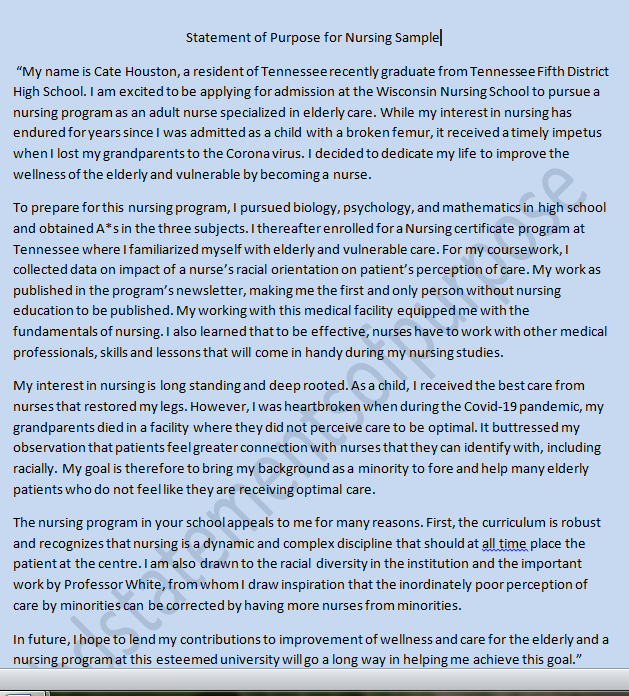
Statement of Purpose Sample for Nursing PhD
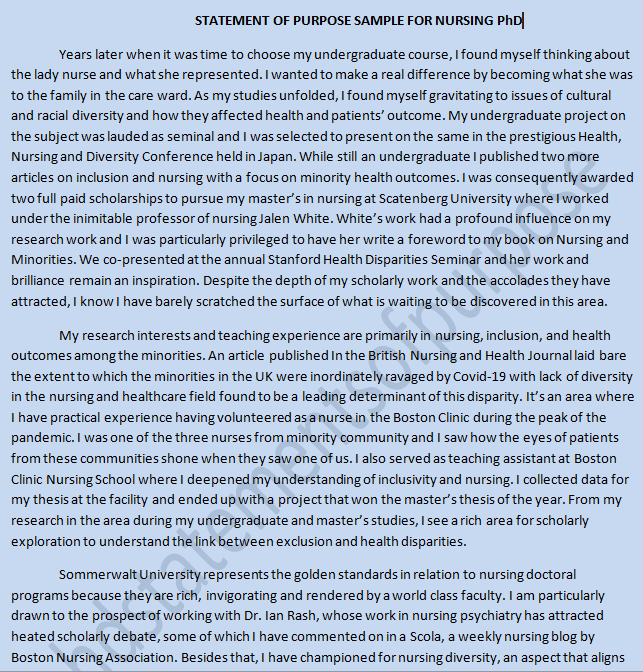
Statement of Purpose sample for MBA
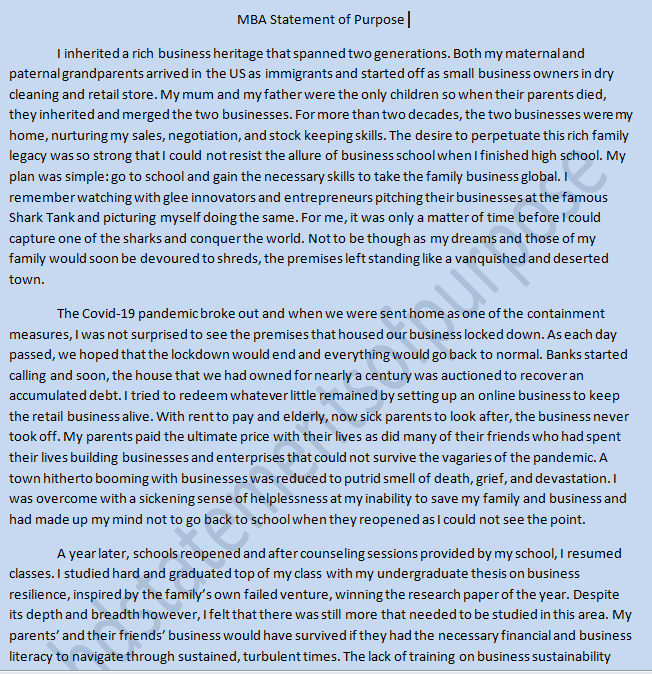
Statement of purpose sample for computer science 2
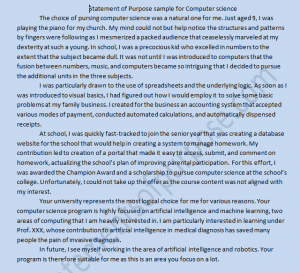
Statement of Purpose Sample in Cognitive Science
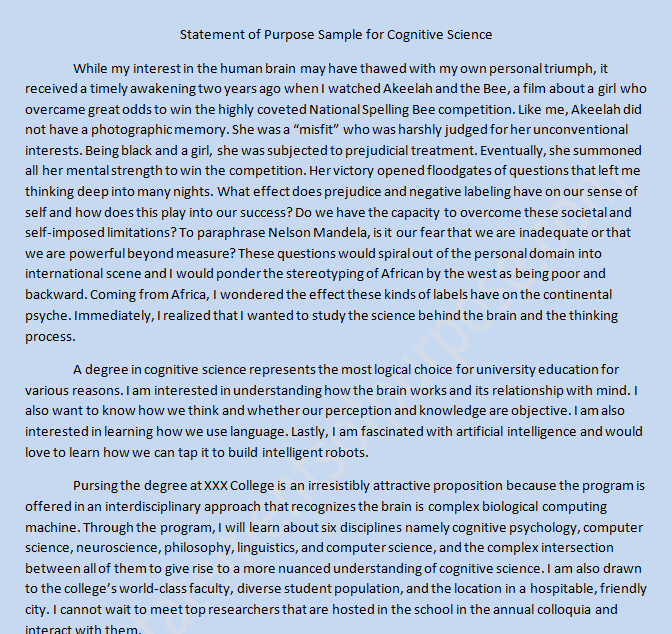
Statement of Purpose sample for mathematics
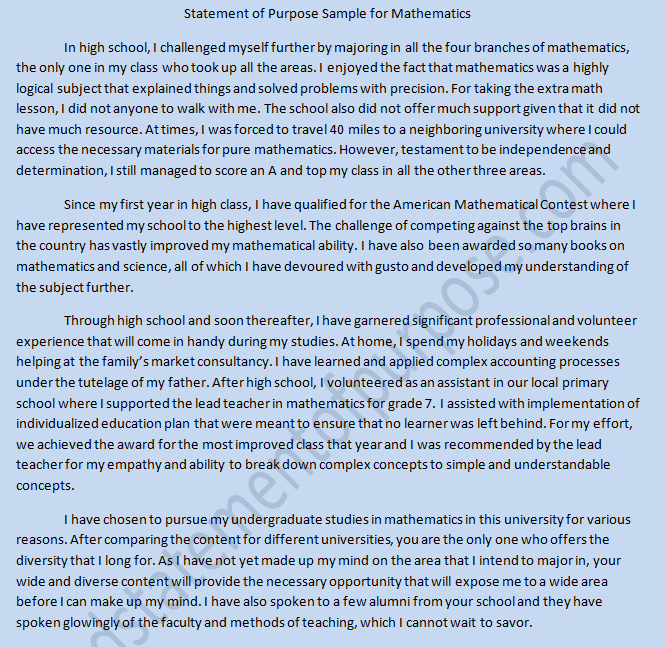
Statement of Purpose sample for MBA with Engineering Background
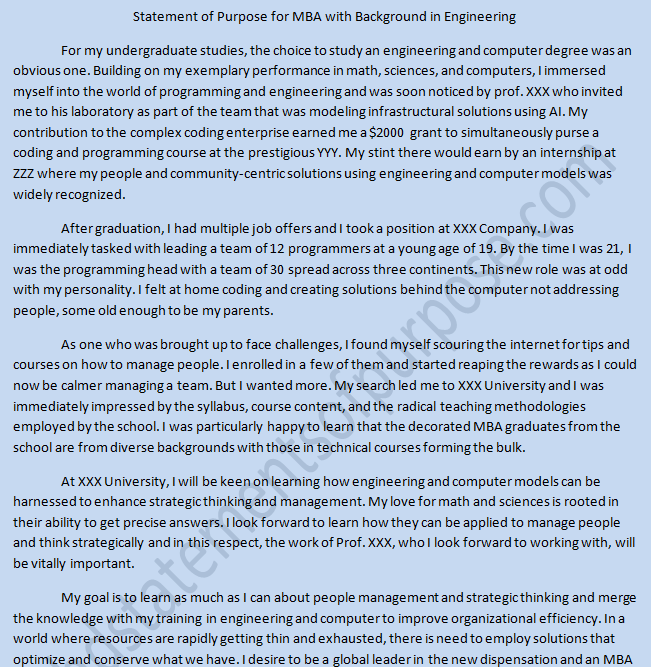
Statement of Purpose sample for Masters in Pyschology
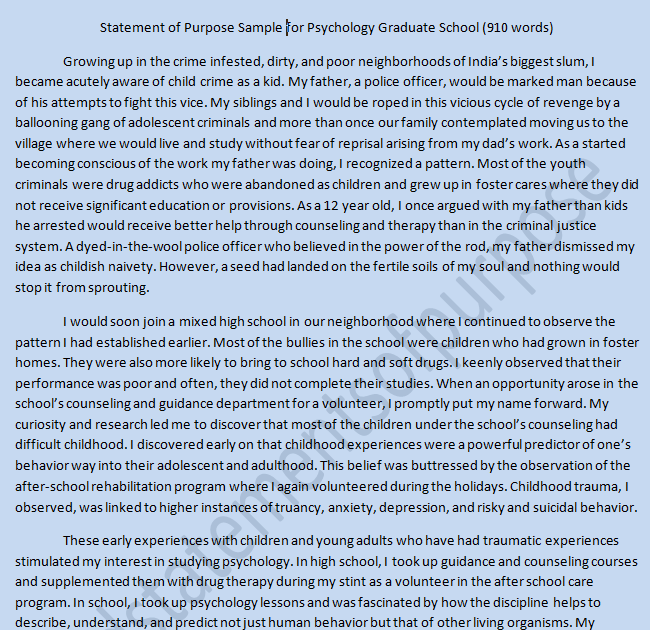
Statement of Purpose Sample for Computer Science
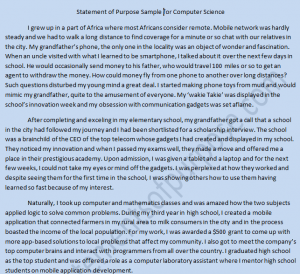
Statement of Purpose sample for Business Management
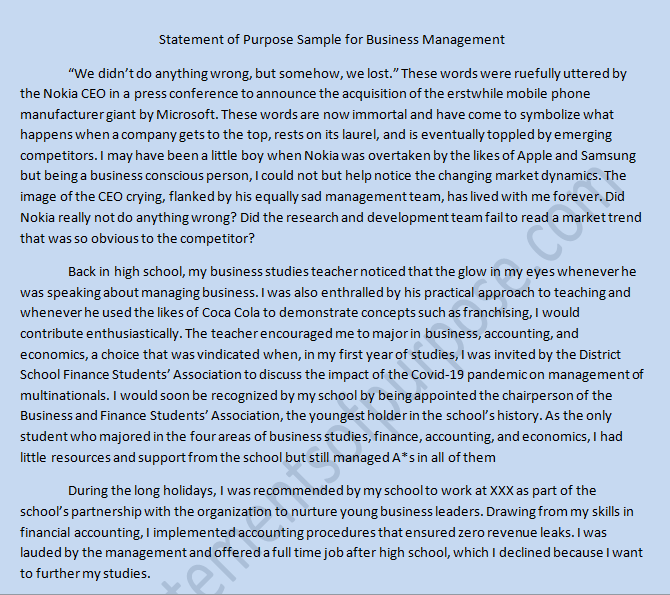
Statement of Purpose sample for Masters in Public Health
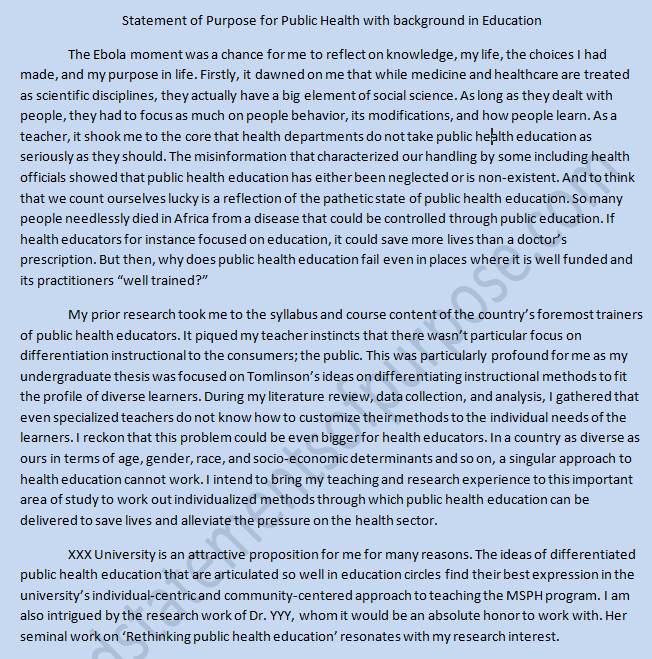
Statement of Purpose for MBA Sample (Ivy school)
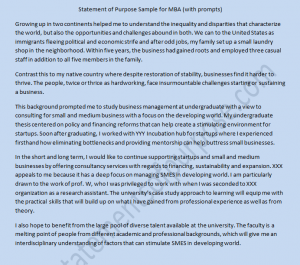
We also edit, review, and standardize other Admission Documents
Admission CV
Personal Statement
Recommendation Letter
Scholarship Essay
Motivation Letter
Cover Letter
Our Promise
- A SOP tailored to your program/university requirements
- Original, plagiarism free
- A SOP customized by an expert in your field
- Direct communication with assigned editor
- Proofreading and plagiarism check
- Punctuality
- Free revision for 2 weeks
- Confidentiality
- Money back guarantee

Let us Polish your Admission Documents
You don’t have to gamble an admission slot because of a low quality admission document. We’re the experts. You can count on us.
Expert SOP Help
- SOP for MBA
- SOP for Law Internship
- SOP for Tourism
- SOP for Social Work
- SOP for Graduate School
- SOP for Ph.D.
- SOP for Engineering
- SOP for Scholarship
SOP Edit & Review
- SOP Proofreading
- SOP Graduate School
- SOP for College
- SOP for PHD
- SOP for Information Technology
- SOP for MPH
- SOP Engineering
- SOP Medical
- SOP for Computer Science
What Our Clients Say
"After hours of staring at my computer screen and attempting to cobble up something together, I decided to try PhD Statements of purpose services. I enjoyed quite a peace of mind as they delivered a SOP that brought out exactly who I am. My nursing doctoral dream is now on course, partly because of the ivy standards services I received."
Michelle Stuart
“I Requested for an MBA SOP and I was quite nervous as I had never used the platform before. It's now my plug for all admission documents. Thanks a bunch."
I needed a Mathematics statement of purpose and an admission CV as quick as possible. These guys delivered these admission documents within hours of placing my orders. They reflected my individuality and I don't know how they did it. AMAZING!!
Dorothy Palmer
"I didn’t realize I could get such a quality Nursing PhD Statement of Purpose online. It was perfectly customized and individualized.Thanks for bringing me up closer to my doctoral program admission.<!-- wp:shortcode -->[learn_press_profile]<!-- /wp:shortcode -->
[learn_press_profile]

Postgraduate Personal Statement Example: Human Resources

Examining examples of personal statements can be exceptionally valuable when applying to a university or college course. Looking through a range of personal statement examples can teach you how to write and structure your application, and you can often learn how to write a personal statement by examining others.
But with so many university personal statement examples available, how do you know which ones are worthwhile and which aren’t?
Postgraduate personal statements should highlight relevant academic and practical experience, research skills and ambitions and their suitability for the course. This postgraduate personal statement example for Human Resources illustrates several of these three critical elements.
Studying master’s degree personal statement examples can be especially valuable. They’re sometimes referred to as personal mission statements or statements of purpose , so if you’re tasked with writing a personal mission statement, the following example will work for you.
I’ve broken down this personal statement example section by section, with a commentary on each element.
That way, you’ll see its strengths and weaknesses and get some inspiration for your own personal statement .
Once you’ve read the personal statement example and analysis, you’ll be able to download a pdf of the whole document, to use as inspiration for your own!

Personal Statement Example: Introduction
“I believe companies need to be employee-centred, as keeping them satisfied, motivated and personally engaged can create immense value for any organisation. Effective human resource management strategies are therefore crucial to business success. However, my intern experience at the Slater-Marshall accounting firm illustrated that HRM often fails to achieve these challenging goals. The reasons are two-fold. Foremost, many small and medium-sized companies have a misperception of recruitment, regarding it simply as a KPI tool instead of finding talents that match their development needs. As a result, time and resources are wasted on candidates who are not a good match for the company. Worse still, many HRBPs are not shrewd or experienced enough to identify the breadth of talent needed by their companies. HRM also loses its effectiveness when it fails to use proven physical and psychological means to provide a fair and encouraging working environment and subsequently incentivise employees.
First-hand experience of these kinds of issues triggered my curiosity regarding contemporary strategies used when empowering companies to employ a sound human resource management system. How can HRM lead to organisation change? How can I develop professional HRM techniques, release their full potential and create harmonious industrial relationships? The desire to equip myself with the relevant understanding and skills is the driving factor behind my application to this MSc Human Resources and Organisations (HRM Stream) programme at the University of Buckley.
This particular course resonates strongly with my career goal of helping traditional enterprises establish enhanced human resource management systems. Your programme offers a variety of opportunities that will aid me in developing a complete grasp of human resource management theory from the perspectives of corporate strategy, business analysis and organisational management. For instance, the Management of People in Global Companies course will afford me a transformative perspective on leadership. This knowledge will assist me significantly when transforming outdated models of human resource management in enterprises lacking advanced human resource awareness.
Furthermore, the Business Strategy, Management and Analytics course will be of exceptional professional value thanks to its cross-disciplinary approach, which will offer me a solid grounding in the comprehensive understanding of management theory, theory of the firm, business strategy, accounting and finance. Professor Sara Blake’s research on organisational behaviour and leadership is incredibly inspiring and aligns perfectly with my goal of strengthening leadership in traditional businesses. I look forward to learning from her and contributing to future projects.”
Commentary and Analysis
This is a long introduction!
This opening section has a strong sense of purpose, connection and opinion, which immediately gives the reader a firm idea of the writer’s experiences and opinions. The writer also uses an excellent range of specialist vocabulary in this example and connects their significant experiences with the course. In addition, the applicant is already making explicit links between the course and their ambitions.
The writer then identifies specific modules and outlines how they will aid their academic and professional advancement. Not only does this connect the writer’s goals with the course content, but it also shows that the applicant understands the course and has researched the details well. The reference to a specific professor from within the faculty and the connection between the writer’s research ambitions and the opportunities presented by the university are compelling. The writer creates a clear link between their suitability for the course and the content on offer.
If you’re struggling with your personal statement introduction, check out my article on how to write perfect opening paragraphs here .

Personal Statement Example: Academic Background
“Majoring in Accounting and Finance as an undergraduate, my dedication to my studies earned me several awards and ranked me top among my peers. Excelling in courses such as Theory of Firm , Introduction to Managerial Accounting and Business Law , I acquired a spectrum of theoretical understandings which underpin HRM. I have independently investigated the organisational role of HRM by exploring Dave Ulrich’s HR model and the six segments of HR management, examining their adoption by companies of different scales. I have learnt that the role of HRM is to identify the kinds of human resources needed by the companies and allocate those resources wisely to maximise productivity and profitability. Consequently, I regard HRM as a people-oriented sector. This makes understanding human behaviours and psychology in the workplace particularly important for industry practitioners.
Studying on the Introduction to Managerial Accounting course, I was informed that how money is distributed within an organisation is crucial since it determines whether employees’ incentives can be fully realised. Thus, establishing a sound salary and welfare system is of great importance. Different people and contrasting organisations have various demands, but a successful compensation and welfare system balances these two demands and activates the organisation’s motivation. My most significant gain from this course is that many aspects of HRM, including setting different KPIs, performance monitoring and well-being management, are based on developing an accurate understanding of employee behaviour patterns. This can lead to a win-win situation in which companies can fully tap into employee value, and workers receive appropriate remuneration and opportunities for progression. Additionally, knowledge of labour laws and regulations has familiarised me with the rights and duties of employers and employees, which will be of great value to me as a graduate student.”
Commentary and Analysis
The first paragraph of this section is written confidently. It outlines some academic achievements without writing them as a list. The writer achieves this by explaining what they gained from their experiences. They then link these elements to the course and show how they will be of value.
The most impressive aspect of the second paragraph is that it illustrates connections between the subject of undergraduate study and the intended postgraduate course. The writer is showing transferable skills that will be of value in the future and making explicit connections between the two different subjects, helping to show how a diverse educational background adds to their suitability.
Again, a sense of value is central to this section. The writer ensures that each example is given a value regarding the application’s demands.
If you’d like to learn more about how to structure your personal statement or statement of purpose , check out my awesome Personal Statement Template eBook here . It’s full of detailed examples of what to include!

Personal Statement Example: Practical Experience 1
“Beyond the classroom, I have operationalised my theoretical knowledge in real-life practice. Interning at the Scorpio Real Estate Development Co, I assisted with the entry procedures for new staff and witnessed the career development of numerous employees from varying departments. Observing the recruitment patterns and preferences of different types of organisations, I observed that state-owned companies tend to recruit talent and offer higher salaries and better entitlements to maintain a low turnover rate and stable employee structure. By contrast, foreign and internet companies attach less importance to stability and focus more on talent creativity. My knowledge of HRM models and labour economy inspired me to think that these differences in recruitment strategy may arise from the varying nature, management structure and strategic positioning of each enterprise. I aim to develop my understanding of these differences during my master’s research.”
By using the example of an internship experience in a seemingly unrelated field, the writer has been able to offer an opinion on their workplace HRM experience. This shows a degree of industry experience but, more importantly, allows the writer to use their expertise to connect with the course’s content.
By offering an opinion of what they observed and showing an understanding of gaps in their knowledge, they are turning a lack of knowledge into a compelling motivation for their application.
Check out lots more examples of personal statements here , and see how they can inspire your application!

Personal Statement Example: Practical Experience 2
“Moreover, this internship taught me that approaches to HRM are constantly being adjusted and adapted based on practical experience. For instance, the Scorpio Real Estate Development Co is an established business. An established company’s policies and incentives allow its employees to be more aware of the steps needed for advancement and long-term growth. After many decades, the organisational structures of big firms stabilise, and roles become formalised and repetitive. This implies that employees should simply repeat previous tasks and rely on the company’s existing operational system, but this approach can cause workers’ inventive talents to diminish with time.”
Commentary and Analysis:
This section deepens the value of the writer’s internship and adds evidence to their understanding of the sector they wish to enter. This is ideal for an admissions reader, as they will note the use of language and complexity of informed knowledge in this passage. This, in turn, adds to the candidate’s academic and professional suitability.
The passage also reflects the writer’s ethos, alluded to earlier, and effectively leads to the conclusion by setting up their professional ambitions.
The one thing that all successful personal statements have in common is that they are concise, engaging and accurate in spelling, punctuation and grammar. Consequently, I always recommend Grammarly to my students and clients.
It’s an outstanding tool for ensuring your personal statement is rich with detail whilst hitting those all-important word limits. Check out the free version of Grammarly here , or hit the banner for more information.

Personal Statement Example: Conclusion
“More positively, many well-known multinational corporations are now devoting more resources to employee training in order to address these issues. It is my intention to place myself at the forefront of this burgeoning field after graduating and apply the skills and knowledge gained from this course to play a critical role in revolutionising the value and application of human resources management in a global setting. I have complete confidence in both your esteemed academic programme and in my capacity to perform outstandingly as a purposeful and positive member of your faculty community.”
The conclusion benefits from brevity and doesn’t recap previous content, both of which are positives. It clearly states the writer’s professional ambitions, which relate directly to the previous content. The passage then links those ambitions with the course, emphasising its importance in helping the writer achieve their goals.
A powerful personal statement, it includes several critical elements: relevant academic and practical experience, ambitions and suitability for the course. It also offers good connections to the course but needs detailed examples of research experience and ambition. However, it doesn’t provide evidence of the academic skills necessary for postgraduate study, although the evidence of prior learning is convincing.
With a little more focus on academic reading, research and skills, this would be a perfect postgraduate personal statement!
For more great advice, check out my article on writing an excellent final personal statement paragraph here .

Click here or on the banner below to get your free download of this complete personal statement example .

Whether you’re looking for personal mission statement examples or an example of personal purpose statement, I hope this personal statement example has been helpful. Above all, I wish you every success in your academic career.
If you’d like to work with me to develop your personal statement 1:1 and write a powerful mission statement, I’d be delighted to hear from you.
Find out about my personal statement support services by clicking here or on the image below.

Research and content verified by Personal Statement Planet .
David Hallen
I've worked in the Further Education and University Admissions sector for nearly 20 years as a teacher, department head, Head of Sixth Form, UCAS Admissions Advisor, UK Centre Lead and freelance personal statement advisor, editor and writer. And now I'm here for you...
Recent Posts
Postgraduate Personal Statement Example: Environmental Policy
Studying examples of personal statements can be a valuable strategy when applying to a university or college. That’s because personal statement examples can teach you how to write and...
Postgraduate Personal Statement Example: Technology Entrepreneurship & Innovation
Examples of personal statements can be valuable to reference when applying to a university or college course. That’s because personal statement examples can teach you how to write and...
Chris Blattman
Phd applicants: writing your statement of purpose.

- January 11, 2022
I’ve read a lot of personal statements for PhD applications. I sat on admissions at UChicago, Columbia, and Yale, mostly in economics, political science, and public policy. Here’s the advice I’ve given my own students and research assistants to craft their statements. I give it because, sadly, I don’t find most statements helpful. This means they are not helping you, the applicant.
As with all my advice posts, it’s important that students outside elite colleges get this information, so here are some personal thoughts.
[Note: You can now subscribe by email to receive posts to your inbox.]
First, let’s clarify your number one job as an applicant: Send the best, clearest signal of your abilities as a future researcher, and minimize the noise around that signal. I explain why in a longer post on whether and how you should apply to PhD programs (including the other elements of an application packet):
the fundamental problems in graduate admissions are “information overload” and “noise”. For every slot in a PhD program, there are probably 30 to 50 applicants. A department that plans to have a class of 20 students may receive 1000 applications. Meanwhile, most departments delegate admissions to a small committee of two to six faculty. They don’t have time to read 1000 applications in detail. And the committee may change every year. Thus, their experience may be limited. And you never know who will be on the committee or what they care about. This adds further randomness. These faculty want to admit the most talented and creative young researchers who will push the field ahead. And they also want you to pass all the most technical classes, because they hate kicking students out. So the admissions committee are looking for strong signals of intelligence, creativity, determination, and other proclivities for research. But this is hard . There are too many applications. Applicants don’t have many good ways to signal quality. All applicants are trying to send the same signals. And there is a ton of uncertainty around each signal. Hence: Information overload and noise.
Yet most schools as for a written statement of some kind. Sometimes they ask for both a biographical statement and a research statement. What do they want and what should you write?
- Don’t tell your life story. This statement is not an undergrad entry essay where you describe your life’s trials and tribulations, or your journey to wanting to do a PhD. It’s not that we don’t care. It’s just that it’s probably not relevant to judging your ability as a researcher. If it is, then weave that into the narrative around your research interests and plans. We have hundreds of these things to read and so you only want to focus on the most important information.
- Don’t be cliché. Do not start your with your epiphany—the day the scales fell from your eyes and you realized you wanted to be a professor, or were inspired tackle big questions and social issues. Especially if it involves a child in a poor country. This approach is overused and unoriginal, and the information does not help us judge whether you will be a great researcher (see point 1).
- Platitudes about wanting to be a professor or researcher
- Generic or flattering statements about being excited to join a program, your admiration for the faculty, etc.
- Unspecific interests in a research subject or field
- Routine information such as “I am graduating in May…”
- Filler sentences like “Please find enclosed…”
- Start with your broad fields of interest (e.g. “I am principally interested in labor and development economics” or “I want to work at the intersection of comparative politics and international relations”)
- Then give 2-3 examples of broad topics and questions that interest you. (“I’m interested in studying inefficiencies in labor markets, especially market power and monopsony. I’m also interested in…”)
- Are tenure or tenure-track faculty
- Have their primary appointment in the department you are applying to
- Are actually there and take students (i.e. they didn’t retire last year, etc.)
- You could discuss two ideas in moderate depth, or one idea in greater depth. Either way, I recommend this research discussion be 40-60% of your entire statement.
- Ideally this is a question or topic of current interest in the field. One thing I often see is that students are focussed on the research frontier 10 years ago (because those are the papers they read in their classes) and are not clued in to some of the current puzzled and priorities. This is hard to avoid, but some reading and your advisors should be able to help you avoid this.
- The best discussions will (if empirical) identify interesting data and discuss plausible empirical strategies. This is difficult, which is why it is a good signal if you do it well.
- It’s important to locate your question in the literature without overdoing that discussion. Try to motivate the question with reference to recent and recognizable research papers and agendas. If you are mainly citing articles with few citations, in lower-ranked journals, this is a sign that you need to link your idea to bigger debates in the field, or perhaps rethink the question you are proposing.
- This is (in my experience) the most crucial section for most social science departments. Except possibly economics. It’s not clear how seriously many departments take your statement in economics, and some of my colleagues profess to never look at the statement. That may be true, but some will look, and you have to have a statement, so I suggest following this advice to make it a research proposal.
- Why you studied physics but now are doing political science
- What happened in that single bad semester on your transcript
- How to interpret your foreign GPA, and where you ranked in your class
- Clarify your classes if they have off names (e.g. “My class called XX was a Real Analysis class using textbook X, and so I have all the mathematical requirements for entry.”
- Get help. Your letter writers, professors you work for, or PhD student you know can read and give feedback on your statements. Ask them for their advice. Do this early–a couple months before the application, ideally. they can help you frame your question in a more interesting way, decide what papers to mention, or what is or is not frontier.
- Don’t be repetitive. This is not the place to restate your CV (“First I worked for Professor… and then I worked for…”). They have your CV. Use this document to do something no other in your application can do. Only mention work or other experience if you can add essential, high-density information the reader cannot get elsewhere in the application packet. Maybe you picked up specific technical skills working on a project that relate to the research proposal you just described? If not, you don’t have to say anything at all about your past. Just let the research proposal speak for itself.
- I recommend using the Hemingway Editor as a tool to write more clearly. Some long and complex sentences are ok, but sparingly. And they can often be improved. Aim for a grade 10 reading level.
- Use active voice
- Omit needless material and words (see points 3 and 9)
- Limit jargon
- Each paragraph should be a distinct idea
- Paragraphs should have a hierarchical structure, with the big idea or general point as the first topic sentence, and the rest of the paragraph elaborates. Someone should be able to get an “executive summary” but simply reading the first line in every paragraph. they should make sense as a story/summary.
- Use subheadings if possible, to delineate sections such as your broad fields of interest (point 4), your research proposal (point 5), and other key information (point 6)
This is just my view. Other professors will have different preferences and advice here. So ask them. Get more opinions. Or put your advice in the comments below.

Subscribe to Blog
Email Address
Recent Posts
Presentation to the joint chiefs operations directorate, from street fights to world wars: what gang violence can teach us about conflict, when is war justified, conversation with teny gross on gang violence, the 5 reasons wars happen, advanced master’s & phds.
- Our Authors
- SDSU Global Campus Website
Select Page
How to Write a Statement of Purpose for Grad School
Posted by Luke Dane | Aug 13, 2024 | Master's Programs
Graduate school is an educational endeavor that requires hard work, dedication, and standing out from the crowd. In addition to submitting undergraduate transcripts, GRE test results, and letters of recommendation, graduate school applicants must write a statement of purpose.
A statement of purpose, also known as a personal statement, allows applicants to explain what they want to get out of graduate school and why they’re a good fit.
“Your statement of purpose is your one opportunity to showcase your unique experiences, future goals, and how the graduate program will help you achieve those goals. Your statement should be authentic, relevant, concise, and professional,” said Precious Jordan-Talley , SDSU Global Campus Admissions Supervisor.
Writing your first statement of purpose may feel daunting, but these tips and tricks will help you get the ball rolling.
Understand the Prompt
While the outline is similar, each grad school has its own prompt. Regardless of the specific prompt, your statement should answer:
- What do you want to study and why
- What experiences do you have in your field
- What do you plan to do with your graduate degree
Admissions committees seek out applicants who provide clear responses to these questions and demonstrate their plans and interests based on their expertise. Overall, Your statement of purpose should answer why you chose your field of study and why you have the background to excel in it.
Show Your Best Self
Including additional skills on your statement of purpose can help strengthen your application, but be selective about which skills you choose to add.
Instead of adding all the skills in your pocket, hone in on the ones you can apply to your degree. Weave in personal anecdotes that showcase your skills to upgrade your statement of purpose from an application to a story.
For example, many graduate students get to teach undergraduate classes. Therefore, including skills like teaching, public speaking, or communication would be beneficial skills to add.
Stand Out From Others
As of fall 2020, graduate school applications rose 7.3% , making it more crucial than ever to stand out from the crowd of applicants.
Making your statement of purpose a story is a great way to set yourself apart from others. Simply put, describe how your skills, experiences, and backgrounds shaped you into who you are today.
Let’s say you’re applying for our master’s in meeting and event management. Instead of listing your experience in this industry, provide a story of how you developed an interest in this field through exploring and honing different skills.
Listen to Feedback
Receiving feedback from a trusted mentor, preferably a professor writing your letter of recommendation, is crucial before submitting your statement of purpose. Having another expert edit your paper can help with content, spelling, grammar, and word choice.
Editors can also give you a new perspective. Since they have a fresh set of eyes, they can see your topics from another angle and offer suggestions to improve the quality of your statement. They can help you develop new perspectives to incorporate into your writing.
“You’ll want to strive for depth by highlighting key experiences that can attest to your qualifications, problem-solving skills, and achievements,” said Precious Jordan-Talley . “Make sure there is a smooth and logical flow throughout your essay and solicit feedback from professors or colleagues to gain different perspectives and make improvements. I recommend exploring courses with Ed2Go to brush up on your writing skills.”
Recent Posts

- Applying to Uni
- Apprenticeships
- Health & Relationships
- Money & Finance
Personal Statements
- Postgraduate
- U.S Universities
University Interviews
- Vocational Qualifications
- Accommodation
- Budgeting, Money & Finance
- Health & Relationships
- Jobs & Careers
- Socialising
Studying Abroad
- Studying & Revision
- Technology
- University & College Admissions
Guide to GCSE Results Day
Finding a job after school or college
Retaking GCSEs
In this section
Choosing GCSE Subjects
Post-GCSE Options
GCSE Work Experience
GCSE Revision Tips
Why take an Apprenticeship?
Applying for an Apprenticeship
Apprenticeships Interviews
Apprenticeship Wage
Engineering Apprenticeships
What is an Apprenticeship?
Choosing an Apprenticeship
Real Life Apprentices
Degree Apprenticeships
Higher Apprenticeships
A Level Results Day 2024
AS Levels 2024
Clearing Guide 2024
Applying to University
SQA Results Day Guide 2024
BTEC Results Day Guide
Vocational Qualifications Guide
Sixth Form or College
International Baccalaureate
Post 18 options
Finding a Job
Should I take a Gap Year?
Travel Planning
Volunteering
Gap Year Blogs
Applying to Oxbridge
Applying to US Universities
Choosing a Degree
Choosing a University or College
Personal Statement Editing and Review Service
Clearing Guide
Guide to Freshers' Week
Student Guides
Student Cooking
Student Blogs
Top Rated Personal Statements
Personal Statement Examples
Writing Your Personal Statement
Postgraduate Personal Statements
International Student Personal Statements
Gap Year Personal Statements
Personal Statement Length Checker
Personal Statement Examples By University
Personal Statement Changes 2025
Personal Statement Template
Job Interviews
Types of Postgraduate Course
Writing a Postgraduate Personal Statement
Postgraduate Funding
Postgraduate Study
Internships
Choosing A College
Ivy League Universities
Common App Essay Examples
Universal College Application Guide
How To Write A College Admissions Essay
College Rankings
Admissions Tests
Fees & Funding
Scholarships
Budgeting For College
Online Degree
Platinum Express Editing and Review Service
Gold Editing and Review Service
Silver Express Editing and Review Service
UCAS Personal Statement Editing and Review Service
Oxbridge Personal Statement Editing and Review Service
Postgraduate Personal Statement Editing and Review Service
You are here
Postgraduate human resource management personal statement example.
Pursuing a masters degree is a responsibility I owe to myself as well as a commitment I have to others. I refer to it as a responsibility because I have a proactive outlook on life, which makes me actively seek and go after the things that I want to accomplish in life. I refer to it as a commitment because I want to be an example to others of the attainments and contribution to society that women can make.
My first introduction to human resource management came as a result of an encounter with Victor Banjo, General Manager Human Resources Oceanic Bank Plc. It was as a result of this encounter that I was able to get detailed understanding of the roles played by human resource in tackling human issues and consequently in organizational success.
In light of this, I have decided to take up the masters program in Human Resource Management because I am interested in the role it plays in achieving organizations goals and objectives, key among them being hiring and training the best employees, and dealing with performance issues.
I am a graduate of Mass Communications from Bowen University. My Mass Communications degree has provided me with a strong foundation as well as fortified me with good communications skills, personal communications as well as organizational communications skills, bearing in mind that the importance of proper communication in the business environment cannot be over-emphasized. In the same vein, professionals of communication recognize the importance of good business practices.
My career goal is to work in a leading firm that places priority on professionalism and lead such organization towards attainment of set goals by making use of knowledge garnered as well as experience. Ten years from now I see myself as a human resource consultant, providing professional advice so that others can make the best decisions.
I believe a masters degree in Human Resource Management is all I need to make this dream come true. It fits the profile of this goal.
Perhaps some of my greatest attributes is that I am smart, hardworking, and inquisitive. I am always willing to learn and I appreciate every opportunity to learn new things or old ones differently. I am sensitive and genuinely interested in others, which makes me confident that HRM is the path I want to tread. Human resources are vital to any organization: without people the organization would not function.
I chose this university because of its great reputation, its renowned academic excellence, and good industry links as well as flexible postgraduate schemes. I look forward to being a part of a renowned institution as your institution. I firmly believe that the right education in the right school will open doors of advancement in my chosen field of study.
Profile info
This personal statement was written by feeblefoxy for application in 2010.
feeblefoxy's Comments
It took me quite a while to put this together because I was really nervous as to what to write in order to get accepted in a reputable institution. However once I started it really went well and I got admitted in a number of reputable British institutions including University of Sheffield, Kents, Salford, Robert Gordon, Aberdeen and some others
Related Personal Statements
Add new comment.
Call us : +88 (0) 1712969390, +44 (0) 7495942849, +44 (0) 7459725824
Sign in | Sign up

SOP - MSc Human Resource Management
- Sample personal statement

09 July, 2022
Sop - msc human resource management share.
- 12 May, 2013
I am writing this statement to express my enthusiasm regarding the application of MSc Management (HR) at university of Brighton in the SEP 2022 intake. I have found this course as best suited according to my future career ambitions. This statement will cover my background, interest towards the study in the UK and how the course and university can assist me in my future professional roles.
My last academic attainment is Bachelor of Arts (Hons) in English which I completed from Sylhet International University, Bangladesh in June 2022. During my bachelor qualification I have studied some significant courses including Cultural Studies, Communicative English Language, Concept of ELT, Techniques in ELT, some other courses in literature, linguistics and ELT which can contribute to my chosen course at your University.
To gain some professional experience, I have worked at Mother's Construction, Sylhet, Bangladesh as an HR & Admin Assistant . I worked there from Jan 2021 to March 2022. Doing research about my career plan, I have realized that I need an internationally recognized qualification which will allow me to manage a better and secure professional career position. In Bangladesh the job market is very competitive as our country is highly over populated. So, to secure a better career position or develop a career, an individual needs some unique qualifications, skills and experience. So, in this regard, I believe that I need further qualification with internationally recognised qualification which can provide me with the required skills and distinct features for my career promotion. Although I have achieved basic office and administrative skills from my current profession along with organizational skills, management skills, communication skills, time management skills and so on during my current professional position. These will help to understand some topics of this masters course. Therefore, pursuing this MSc qualification from your institution would be appropriate to become an industry professional in HR
In this contemporary world, business organisations demand multi-skilled individuals with all- round qualifications in business, finance, banking, management, marketing to keep pace with the competition and they require the graduates with premier knowledge in all these key areas. I have designed and planned my future career to establish in export oriented companies such as the garments and textile industry. It is notable that during the pandemic time I have attended some virtual career fairs and consultation sessions regarding the future career and employability prospects whereas one of them was organized by Institute of Business Administration, University of Dhaka, Bangladesh. After doing an honest assessment and research regarding my-self, I have found theoretical gaps in strategic strategic marketing and management, global business environment, logistics and operations management, leadership and I want to develop my shortage skills and knowledge including creativity and innovation skills, data analytics, Research methods, advance management skills, project consultancy, communication skills and so on. In my research I have found the course offered by the Brighton Business School will be as best match to secure a better professional position with distinct skills and knowledge in terms of my future short term and long- term career ambitions.
I want to study this course because of its practical learning approach, professional recognition, industry links, international exposure and unique and appropriate modules as per my career.
Find more resources
- ACCA Programmes
- BSc (Hons) Professional Accounting Course
- Personal Statement - LLB (Hons) Law
- SOP - BSc (Hons) Computer Science programme
- Personal Statement - MSc Business with International Management
Read similar resources
BA (Hons) Business Management (Final Year)
Business success requires a breadth of knowledge and abilities of efficient management to survive in fierce global co...
BA (Hons) Business and Marketing
Modern business is a dynamic environment in which customer wants and needs constantly change at an ever-faster pace. ...
Association of Chartered Certified Accountants
Following my MSc in Financial Management qualification in 2012, I have been in constant search for a real career for ...
Are you looking to study abroad?
Touch your dream with University Admission Expert
- Offering 15,000+ courses at 100+ study locations
- Maintaining 99% visa success rate
- Serving with 14+ years accumulative admission experience
- Providing end-to-end services, almost 24/7
Newsletter Subscription
Keep up to date with the latest news on UK student visa, courses, universities, scholarships, start dates, study guides etc.
Post Comment
SOP for Human Resource Management

Best SOP For Masters In Human Resource Management
Writing a statement of purpose for MS in Human Resource Management can be perplexing. Inexperienced writers might find it difficult to keep the fine equilibrium between subjective and official writing style. We have also seen some students make the mistake of writing in an experimental fashion. Another challenge is telling everything you want in the allowed word limit, or sometimes meeting the minimum limit. If you are facing a similar situation, don’t be concerned. We have expert writers who can help you with SOP for MS in Human Resource Management by meeting all demands.
Seek Experts’ Help for The Best SOP For Human Resource Management
As you get closer to the application process, you will come to know about SOP for human resource management . It is an essential document you will need to submit to clear the selection rounds. Don’t worry because we have the expertise in crafting the perfect SOP for human resource management pd f.
Read Our Sample SOP For Masters in Human Resource Management
SOP for each course is different. If you want to get a general idea about SOP for masters in human resource management , you will have to refer at least one SOP sample. By way of reviewing previously drafted Human resource management SOP sample , you will come to know:
- How you must approach SOP writing?
- What should be the ideal length of your writeup?
- Which tone you must adopt for your writing?
- What points you should write about?
For any SOP Writing Help, Contact Us
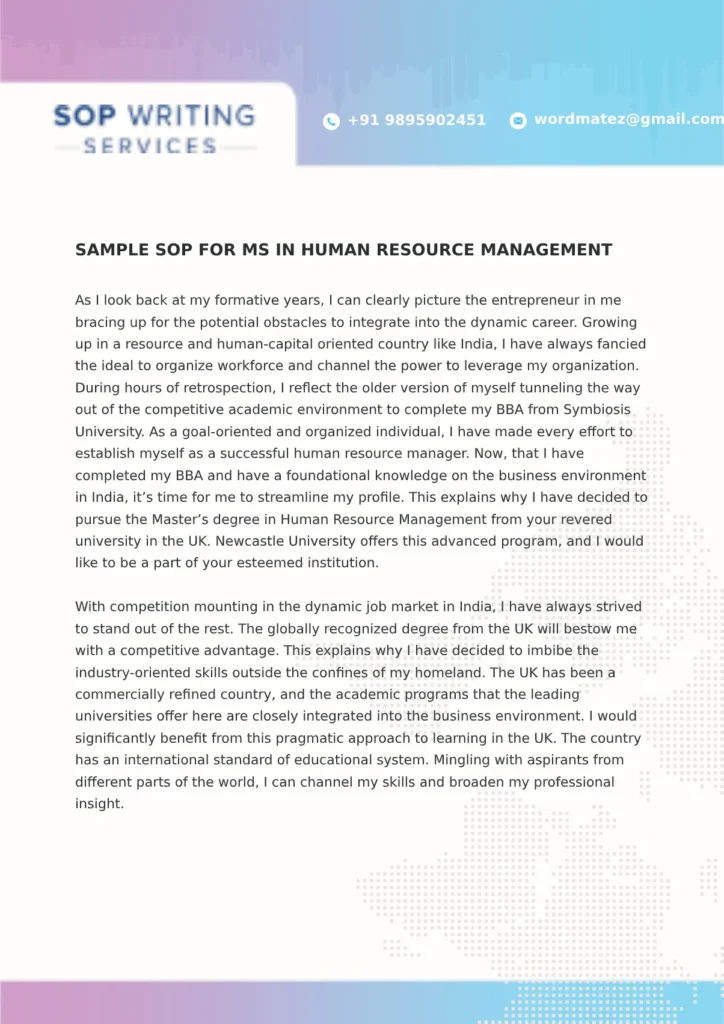
HUMAN RESOURCE MANAGEMENT SOP SAMPLE
As I look back at my formative years, I can clearly picture the entrepreneur in me bracing up for the potential obstacles to integrate into the dynamic career. Growing up in a resource and human-capital oriented country like India, I have always fancied the ideal to organize workforce and channel the power to leverage my organization. During hours of retrospection, I reflect the older version of myself tunneling the way out of the competitive academic environment to complete my BBA from Symbiosis University. As a goal-oriented and organized individual, I have made every effort to establish myself as a successful human resource manager. Now, that I have completed my BBA and have a foundational knowledge on the business environment in India, it’s time for me to streamline my profile. This explains why I have decided to pursue the Master’s degree in Human Resource Management from your revered university in the UK. Newcastle University offers this advanced program, and I would like to be a part of your esteemed institution.
With competition mounting in the dynamic job market in India, I have always strived to stand out of the rest. The globally recognized degree from the UK will bestow me with a competitive advantage. This explains why I have decided to imbibe the industry-oriented skills outside the confines of my homeland. The UK has been a commercially refined country, and the academic programs that the leading universities offer here are closely integrated into the business environment. I would significantly benefit from this pragmatic approach to learning in the UK. The country has an international standard of educational system. Minglin9 with aspirants from different parts of the world, I can channel my skills and broaden my professional insight.
Academically, I have been a consistent performer all these years. In 2017 and 2019, I cleared my Secondary and Higher Secondary Examinations with 93% and 96% marks, respectively. All these years, I have been proactive in extracurricular activities that significantly leveraged my soft skills. During my leisure hours, I spend my time playing chess, that sharpened my mental faculties. For a refined mentality to work, I knew that I need to feed myself healthy doses of reading. So, l spent my weekends reading anecdotes and biographies of successful entrepreneurs around the world. I also loved leading teams, and found pleasure in participating in events like debates and extempore competitions during my school and college. Working on different projects during my graduation, I got the opportunity to streamline my leadership skills. My foresight into my profession helped me realize the value of working on my organizational and leadership skills early on. So, I spent time imbibing these traits, and here I stand today, willing to master the advanced skills in human resource management to embrace a happening career in my homeland, India.
The course that I am willing to undertake is perfectly in line with my past academic accomplishments. As a part of my BBA program, I became familiar with some of the modules that are a part of the HR management program at your university.
knowledge while embracing my dream career. On some of the modules, I learnt how organizations across different scales can manage their human resources. Moreover, I worked on different case studies, that bestowed me with a practical understanding on dealing with workforce issues. The program that I have already completed in India was comprehensive. This helped me gain the basic concepts on organizational behaviour, people management. and economics. Now, I am capable of learning the broader aspects of human resource management. As a part of the Master’s program that I am willing to pursue, I will gain familiarity with different approaches to people management, and will be able to nurture valuable manpower back at my organization when I complete this course.
After scrutinizing the program modules that Newcastle University has been offering, I realized that this course would suit my requirements perfectly. On completing the
pro9ram, I will gain a strong understanding on the importance of social and ethical issues on human resource management. Also, this course will train me up to deploy my knowledge and skills to resolve global problems related to human resource management in practical ways. The curriculum is interactive and includes activities
like group exercises, role-play, and case studies. Besides, I wish to capitalize on the opportunity to acquire advanced skills from globally famed researchers as well as practitioners. Moreover, the program requires the aspirants to work on an HR resource project independently. This practical way of learning will help me master the desired skills to perfection. Considering this holistic approach to educating the aspirants, I have decided to pursue the program at this university.
I will return to my homeland and tap the lucrative opportunities at leading MNCs. Companies in the iT and manufacturing sector, such as IBM. Cognizant, TCS, Tata Motors, and Accenture are on the lookout for accomplished professionals to fulfill their HR requirements. As a skilled and certified professional, I would get an edge over my peers. Recruiters in India as well as in other countries significantly value degrees that HR professionals obtain from the UK. Therefore, this program at your esteemed university will streamline my career.
I have been a fervent learner all these years. Currently, I am looking for an industry-oriented program from the UK, that can streamline my professional profile. lndia is a highly labour-oriented country when it comes to the workforce. Therefore, I would like to face the challenges that lie ahead of me in nurturing this talent and making the best for my organization. On completing the Master’s program in the UK, I will try to establish myself as an accomplished HR professional immediately. In the long run, I look forward to walk in the shoes of a successful HR manager. An opportunity to study at your revered university will significantly help me realize my professional goals. I humbly request you to give me an opportunity to imbibe the skills, spearheading my care
SOP Samples For Masters
Are you Searching for the perfect SOP Samples for MS ? Here we have attached a few SOP samples to make your understanding clear. Click on the below-attached links to download free samples.
How Do We Write an Admissible SOP For Masters In Human Resource Management?
Human resource management is one of the courses that attracts millions of students every year. Oftentimes, universities have to follow strict screening to select the right candidates from hundreds of eligible applicants. If you have a poorly written and formatted SOP for human resource management pdf , you will have tough time making it through the admission process despite having good academic scores. How do we help students secure their seats even at institutes which are pretty hard on the selection process?
Engaging writing style
We will grab the attention of the selection officers from the very first sentence. Our writers are extremely skilled in drafting content that engages the readers and compel them to take action.
Zero mistakes
Being a highly critical document in the admission process, SOP needs to be free from mistakes. We are very particular about rendering you a writeup that is free from all types of mistakes.
Covers all areas
Our experts know what details your SOP for human resource management should consist of. Besides gathering relevant details from you, we will research to draft a complete writeup.
Use of standard English
We have in-house SOP writers with strong command over English. Our QA team consists of native English speakers. So, we can ensure the use of standard English language in your writeup.
In line with requirements
Before we start composing your SOP, we will ask you if your university has announced compliance of any specific guidelines. We will furnish your writeup in total compliance of those requirements.
Interest highlighted
We will highlight your interest for higher studies in HR management by identifying its relevance with your previous academic and professional backgrounds or by giving valid reasons for your interest in the subject.
Tailored to panel’s expectation
We write your human resources grad school statement of purpose with a clear understanding of what the admission council looks for in the document. Our experience in the profession enables us to do this effortlessly.
Accepted format
Our professional SOP writers are familiar with all the recognized SOP formats. Depending on your desired country, institute, course and program, we will follow the right format you recommend for your writeup.
Sample sop for PhD
In search of the ideal statement of purpose sample for phd? To help you understand, we’ve included a few SOP samples that have been approved by experts. To download free samples, click on the links in the attachments below.
Five Blunders We Avoid in Your SOP for Human Resource Management
Your SOP needs to be a perfect piece of writing that clearly introduces you to the selection committee and doesn’t overdramatize any point. We have noticed that many students end up making poor SOP because they commit these common mistakes.
logical claims
Not proofreading, praising the university, dishonest claims, too lengthy, five compelling reasons to hire professional sop writers.
As a professional document, Human resource management SOP requires deft treatment throughout it. If you get it prepared by a professional who knows the craft, you will have higher chances of coming to the forefront in the admission process.
Organic nature: A professionally written SOP will look organic in its way of presentation and narration of your story. It will be both natural and informative.
Professional SOP writers do not copy or paraphrase an existing SOP for human resource management pdf. They write an original one from the scratch, retaining uniqueness.
Organic nature
A professionally written SOP will look organic in its way of presentation and narration of your story. It will be both natural and informative.
Saves your time
Spending a great deal of time for writing an SOP at the cost of compromising myriads of other things can put you under great pressure. Professionals can save your time.
All details covered
When you write the SOP by yourself, you are likely to miss many points. Professionals will make sure all the important points are covered in it.
Quality is maintained
A professionally written SOP has superior quality for the very reason that it is prepared by one who is fully dedicated for the job.
OUR SOP SERVICES FOR COUNTRIES
Why we excel as SOP writers for MS in Human Resource Management?
As a renowned and recognized SOP writing service provider, we have technical knowledge, resources and infrastructure to process and deliver your SOP orders on time in perfect quality. If you are looking for the best agency to draft your SOP for human resource management pdf , we are the ones who you can rely on. Our specialties include:
Unique content :
Free revision:, worth your money :, specialist writers :, recognized by universities :, adheres to standards :, timely delivery:, experience :.
How Do Students Review Our Sop Writing Services?
I hired Sopwritingonline to prepare my SOP for masters in human resource management . I had tried to write it by myself initially but that didn’t work. I got the SOP from them on time as promised. It is far better than the sample reviewed first.
I received the good news from the university that my application is approved. Thanks to Stop Writing Online and the fantastic writers they employ. They are truly professional and all their claims are valid and can be trusted.
I am happy about my decision to hire an SOP writer from Sopwritingonline to compose my SOP for human resource management. They have deep knowledge in the subject discipline and know the craft of SOP writing.
Other Writing Services For Students
Frequently Asked Questions
You can have 100% assurance regarding the originality of the SOP we create for you. We don’t just say that in words. We prove it by sending you a CopyScape tested SOP. We are strictly against modifying or modelling old human resource management SOP sample .
You can talk to our customer support agents via the given phone number or WhatsApp number during the office hours or email us 24/7. We normally return your email queries within a couple of hours.
Yes. Your order for the SOP will start only after the payment is confirmed.
We ask you to make payment and place order for your SOP from us only after you are totally convinced of our writing quality and the price. We allow you to review a previously done sample SOP for masters in human resource management . Additionally, we will let you go through the first draft of the SOP and give feedback. This will literally mean you will not have to cancel your order halfway through. We don’t entertain that.
We charge you on the basis of your desired deadline and the total word count in your SOP. We offer two different delivery plans – emergency and normal. You can get your completed order within 24 to 48 hours via our emergency plan whereas it may take three to four working days to deliver the final copy via the normal plan. Emergency plan for an SOP for HRM costs more than the normal delivery plan.

+91 98959 02451
Ernakulam Kerala 682028
© 2022. All rights reserved.
Writing Service
- SOP Writing Services
- LOR Writing Services
- Personal Statement Writing
- Admission Essay Writing
- College Application Essays
- Scholarship Essay Writing
- Student Resume Writing
Quick Contact
Description
| / ✓ % width | Posts: |
Statement of Purpose For PhD in Management (MBA) -- human behavior

OP asif2311 1 / 2 Apr 1, 2010 #4 Thanks alot Linmark and kevin, I wrote this piece as a first draft and at one go just to put the experiences together. That is primarily the reason why the grammer has gone hey-wire. You guys are great and Ill post a refined statement in a few days. I am struggling to shorten this statement as of now, but ill try my best. Apart from the grammer kevin what do you think are the areas to improve on? I have put everything as honestly and straight a possible. Whatever I have realised over this period of working in different projects, I have tried to post in words. So any suggessions on the content.
OP asif2311 1 / 2 Apr 2, 2010 #6 Thanks alot kevin now i can really work on this, ill come back with these changes in a few days...
| / / |


IMAGES
COMMENTS
Statement of Purpose - Human Resource Management. As college and graduate degrees have become more important in the modern job market, it has become increasingly important to find ways to stand out and offer a competitive advantage. This is why I have decided to leave my native country and pursue a master's degree in the UK, as the exposure ...
Applying to a PhD program? Learn how you can craft an effective SOP with tried and true statement of purpose for PhD samples.
Statement of Purpose (SOP) or Personal Statement forms a crucial element of the graduate school application process. For the uninitiated, a Statement of Purpose is an essay that introduces YOU to the Admissions Review Committee (AdCom). It contains your accomplishments, career plans, and reasoning of why you think a particular graduate program is the 'right fit' for you.
A statement of purpose is a key part of graduate school applications. Our guide explains how to write one that aligns your goals with your program's expectations.
What do you hope to accomplish in the future? How do you see this program helping you achieve these goals? A statement of purpose describing your research interests In your statement, please discuss: Your background: how your experiences (education, work, volunteer, and/or personal) have prepared you for graduate study;
A strong statement of purpose is critical to your graduate school application. Here's a step-by-step guide to impressing the admissions team.
A PhD statement of purpose gives admissions committees an introduction to your research interests and why their specific program is of interest to you. Like a cover letter for a job application, a great statement of purpose allows you to highlight your strengths, interests and experience. If you need statement of purpose advice, keep reading ...
The graduate school Personal Statement (≈ Statement of Purpose ≈ Statement of Intent) is a document that complements your resume and application form, describing your profile in a narrative way and convincing the admission committee that you would be a good match for a particular department or program. Take into account that matching goes ...
A Statement of Purpose goes beyond the traditional Personal Statement. It asks applicants to not only describe their professional journey and how that led to their research interests, but also offer additional insight into their proposed area of study. This article offers a useful framework for writing your Statement of Purpose as well as tips to get you started.
The statement of purpose, sometimes called a personal statement, is an essential part of PhD applications. It functions similarly to a cover letter; it should convince the reader (in this case the selection committee) that you have the right qualifications, motivation and professional goals to pursue graduate studies in their program. Use the tips below to write a statement of purpose that ...
This guide explains how to write a statement of purpose for graduate school, then offers 7 examples of successful statements of purpose, with in-depth analysis from experts.
PhD Statements of Purpose > Samples. Some of these samples have been accepted by top programs. They have been graciously shared by past applicants for educational purposes. We hope they inspire you to write your own. Drop us a draft of your SOP, PS, LOI, ML, &/or LOR for. Expert 1 v 1 Guidance (includes reviewing and editing)
Postgraduate personal statements should highlight relevant academic and practical experience, research skills and ambitions and their suitability for the course. This postgraduate personal statement example for Human Resources illustrates several of these three critical elements.
PhD applicants: Writing your statement of purpose. January 11, 2022. I've read a lotof personal statements for PhD applications. I sat on admissions at UChicago, Columbia, and Yale, mostly in economics, political science, and public policy. Here's the advice I've given my own students and research assistants to craft their statements.
Learn what to include in a statement of purpose, explore five statement of purpose examples and review a few writing tips to enhance your graduate application.
Want a perfect statement of purpose for a PhD sample? We at Yocket will help you with the best samples, tricks and PhD guide. Learn to write the most effective PhD SOP by reading this blog!
Graduate school is an educational endeavor that requires hard work, dedication, and standing out from the crowd. In addition to submitting undergraduate transcripts, GRE test results, and letters of recommendation, graduate school applicants must write a statement of purpose.
Postgraduate Human Resource Management Personal Statement Example. Pursuing a masters degree is a responsibility I owe to myself as well as a commitment I have to others. I refer to it as a responsibility because I have a proactive outlook on life, which makes me actively seek and go after the things that I want to accomplish in life.
LeBow's PhD program director shares his advice on writing a strong personal statement for admission into doctoral programs in business and economics.
MSc International Human Resource Management Note: the example personal statement (statement of purpose) below is for guidelines only and to help you understand how to write one - do not copy any part of it. When applying to universities, write your own personal statement (statement of purpose) according to your profile for the course you are applying. Please check HERE for detailed guidelines ...
SOP - MSc Human Resource Management Note: the example personal statement (statement of purpose) below is for guidelines only and to help you understand how to write one - do not copy any part of it. When applying to universities, write your own personal statement (statement of purpose) according to your profile for the course you are applying. Please check HERE for detailed guidelines on how ...
Best SOP For Masters In Human Resource Management Writing a statement of purpose for MS in Human Resource Management can be perplexing. Inexperienced writers might find it difficult to keep the fine equilibrium between subjective and official writing style. We have also seen some students make the mistake of writing in an experimental fashion.
Statement of Purpose For PhD in Management (MBA) -- human behavior asif2311 1 / 2 Mar 28, 2010 #1